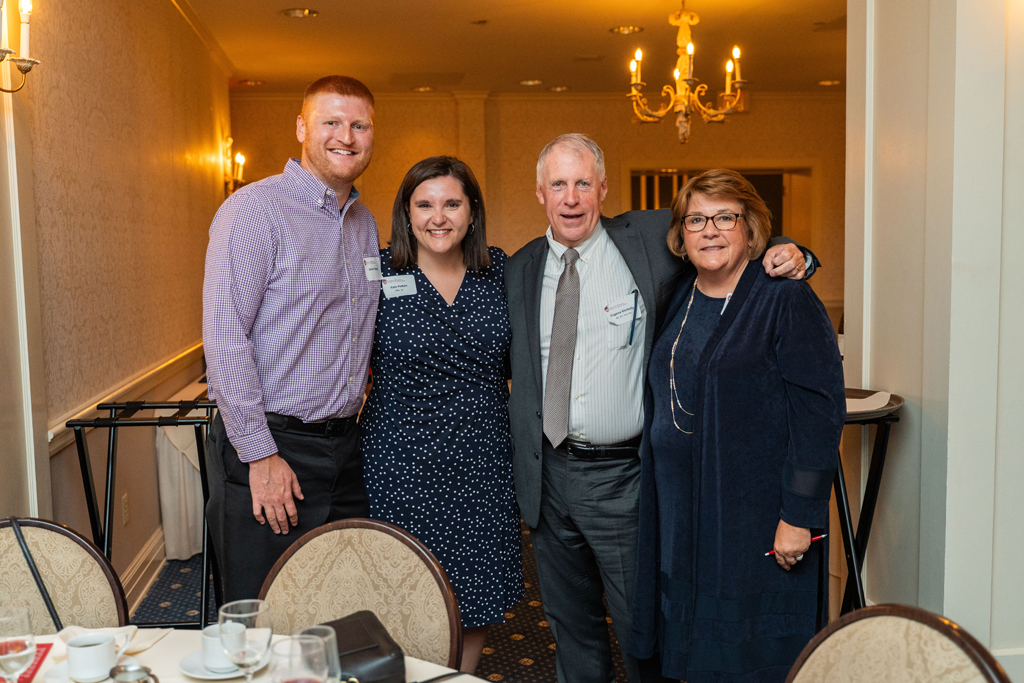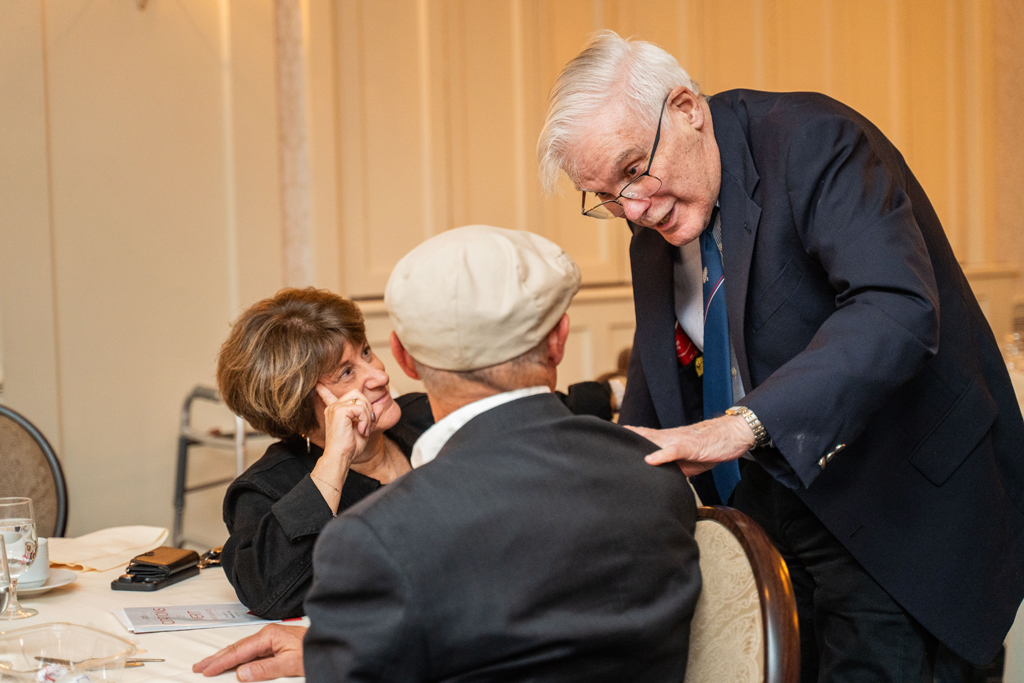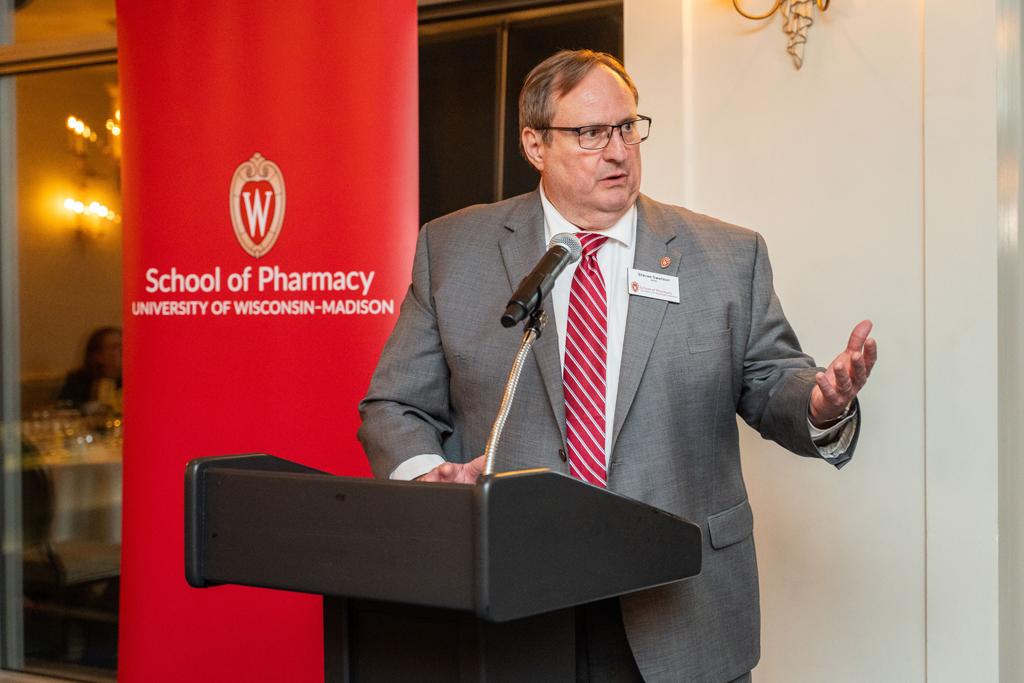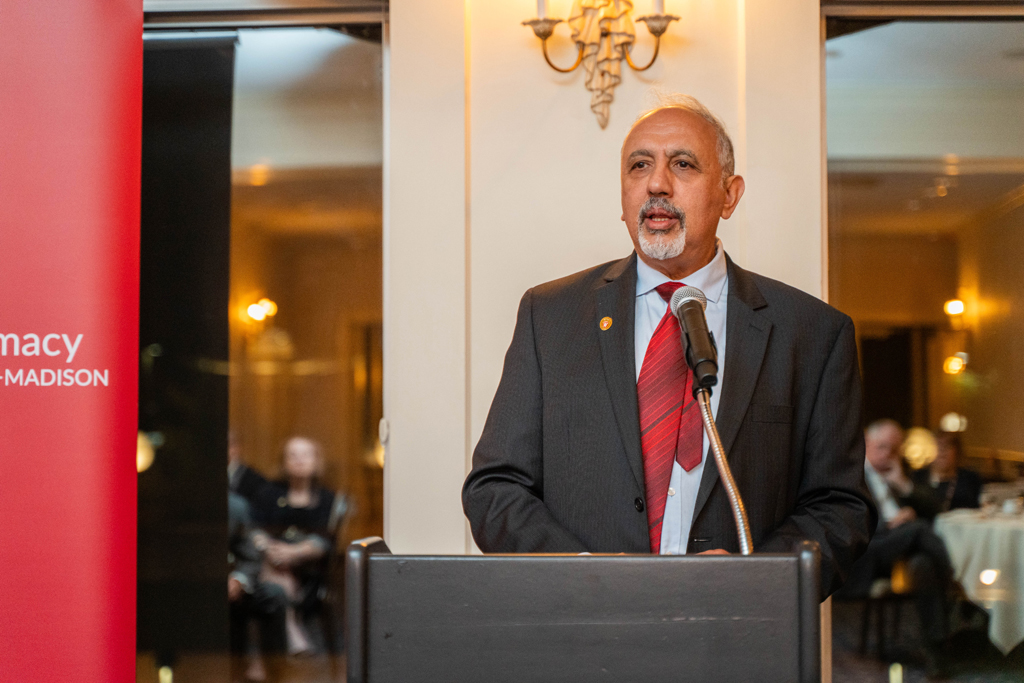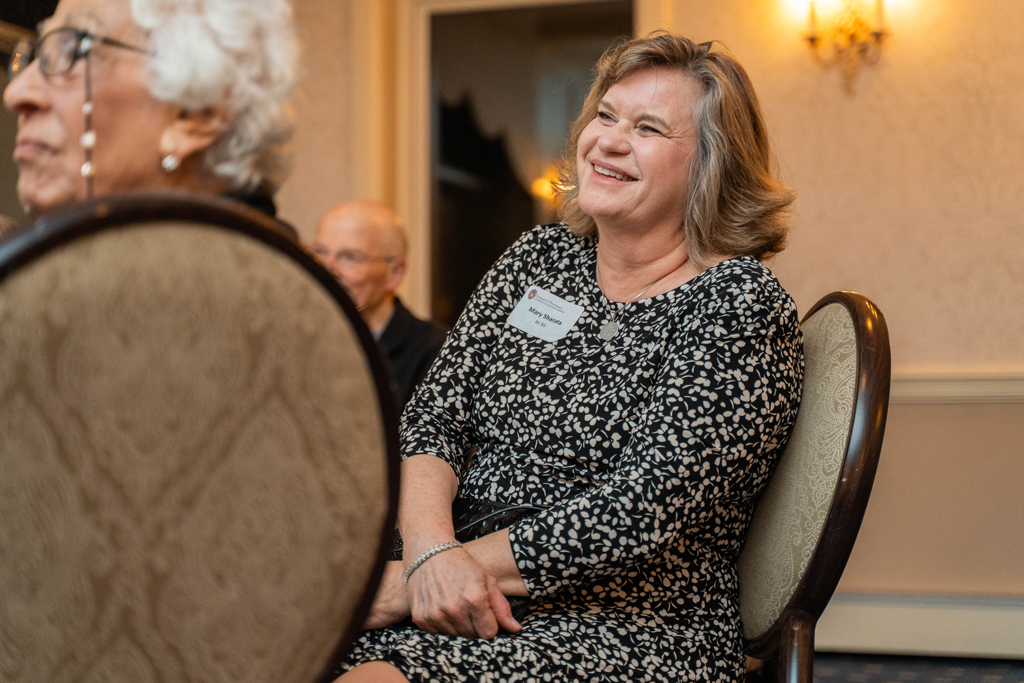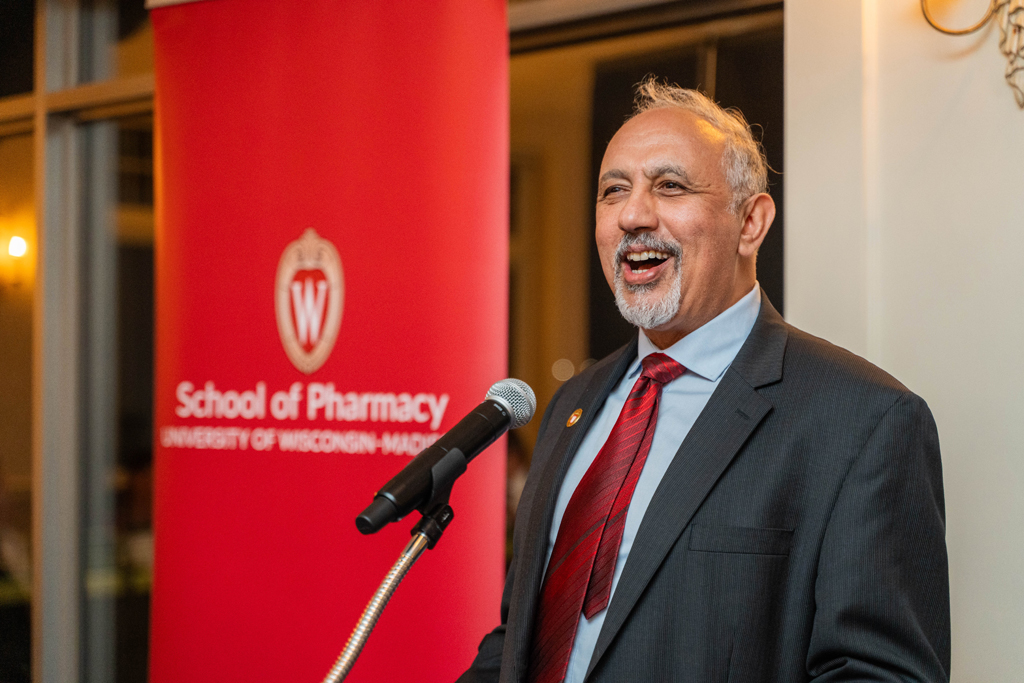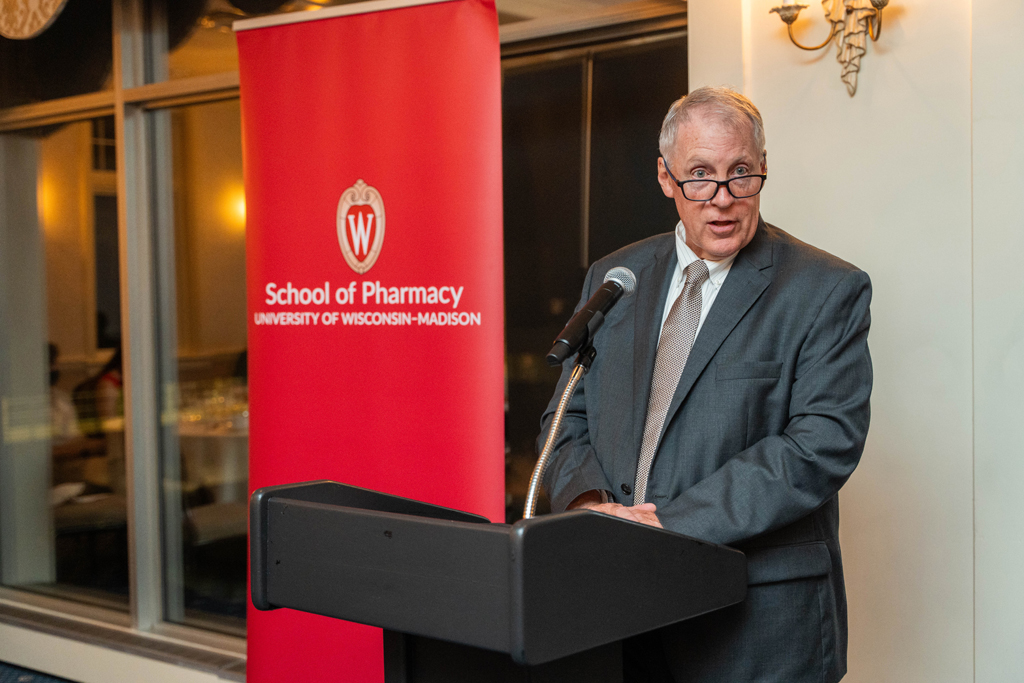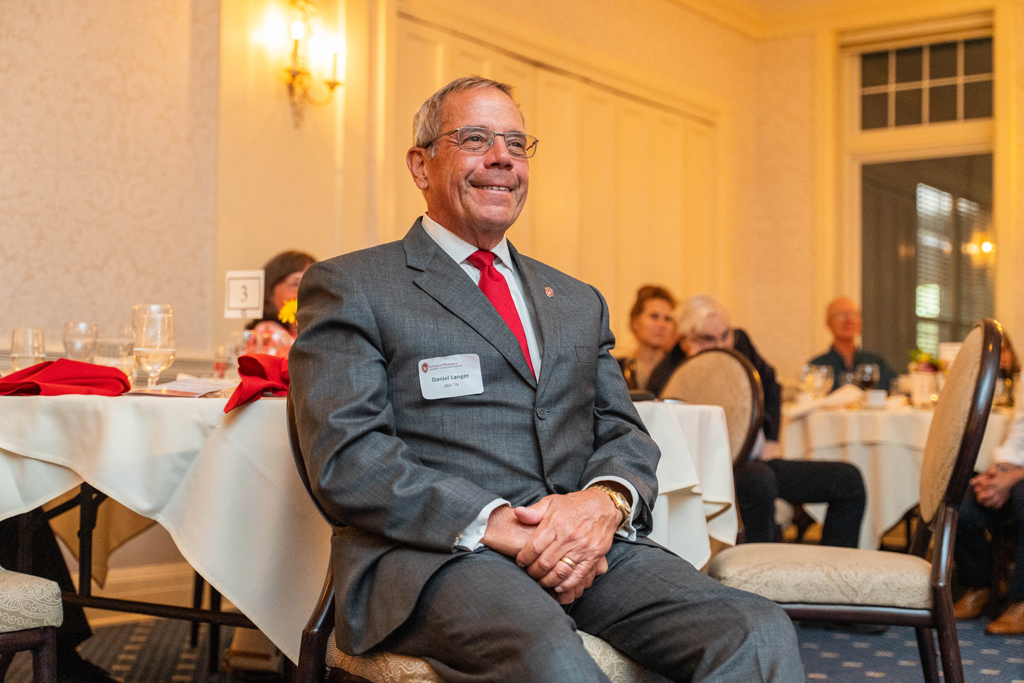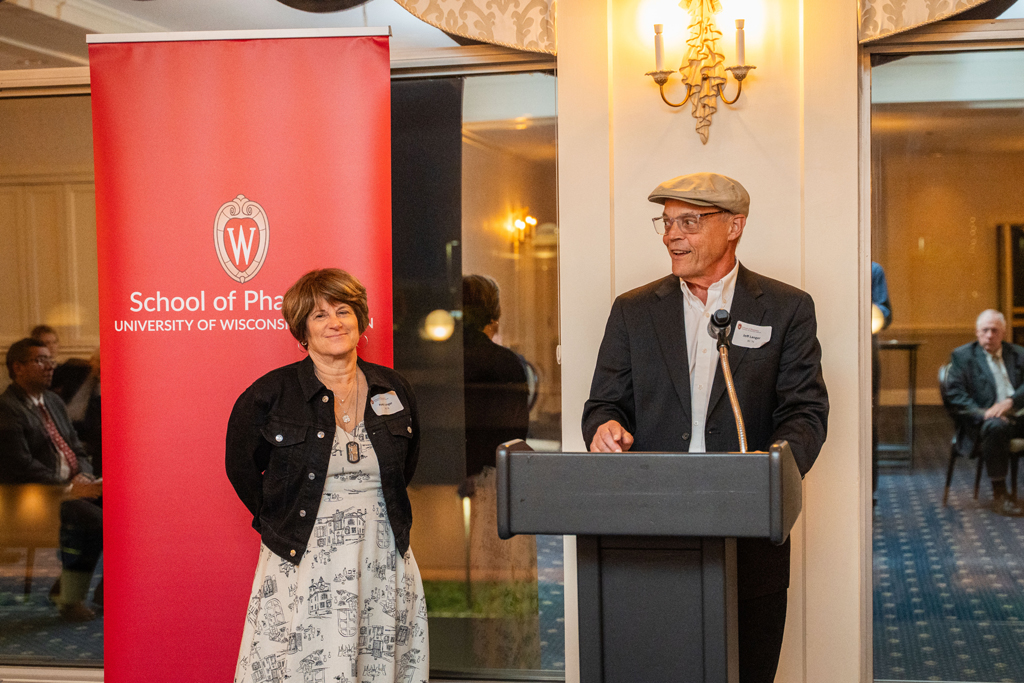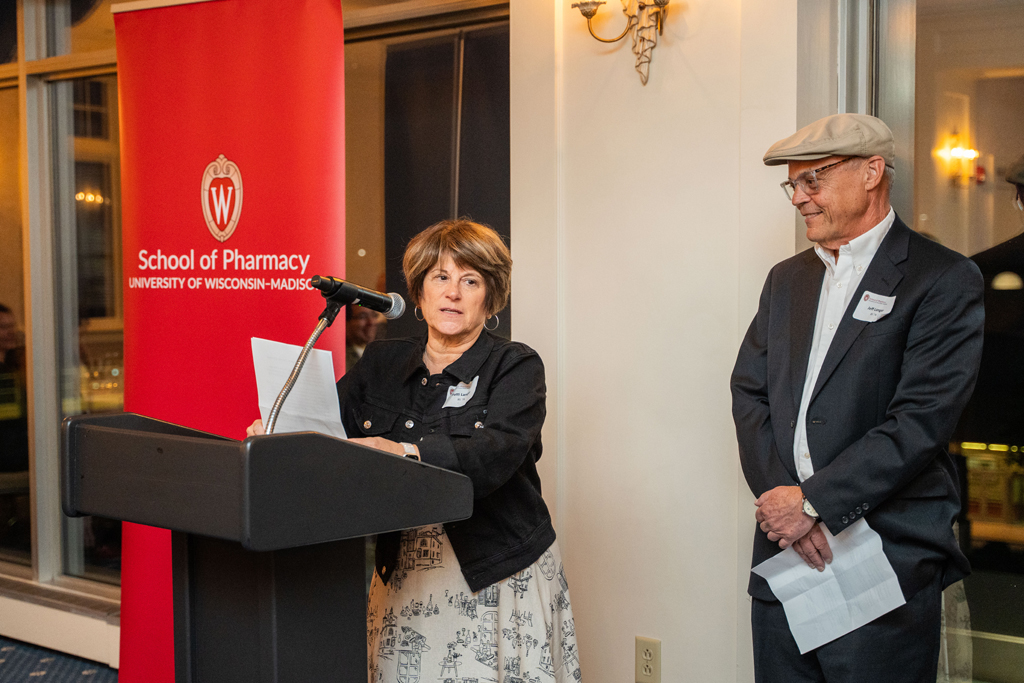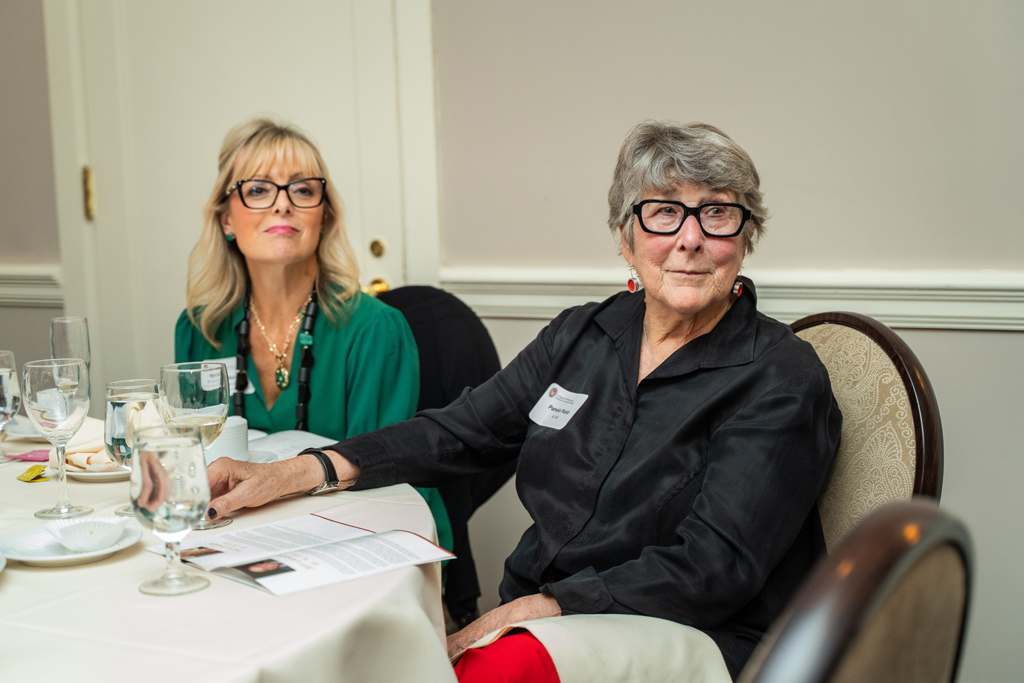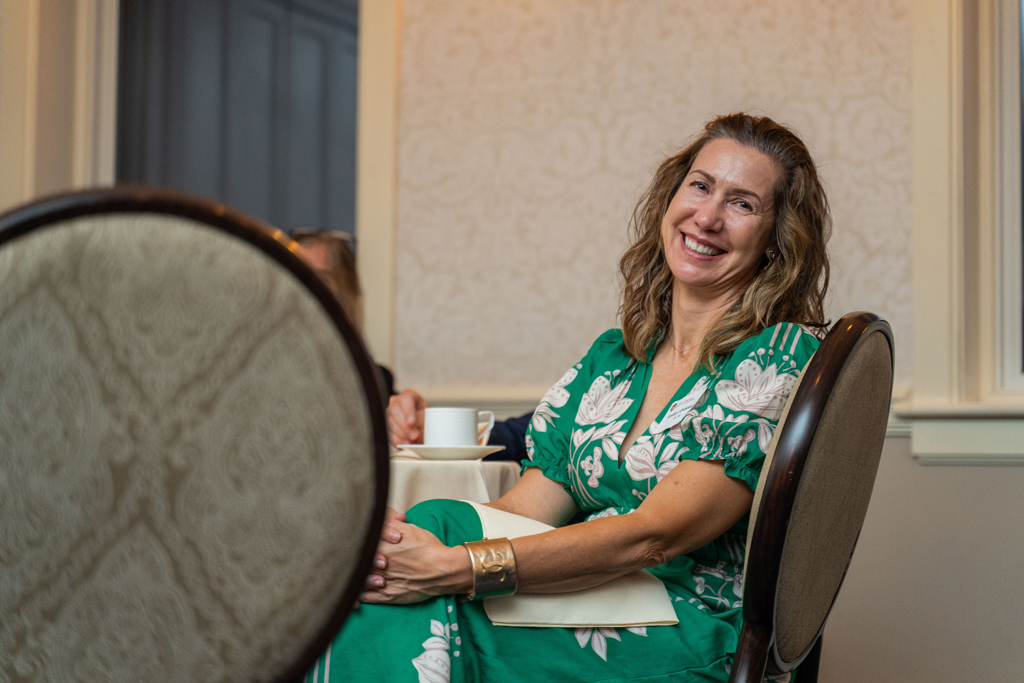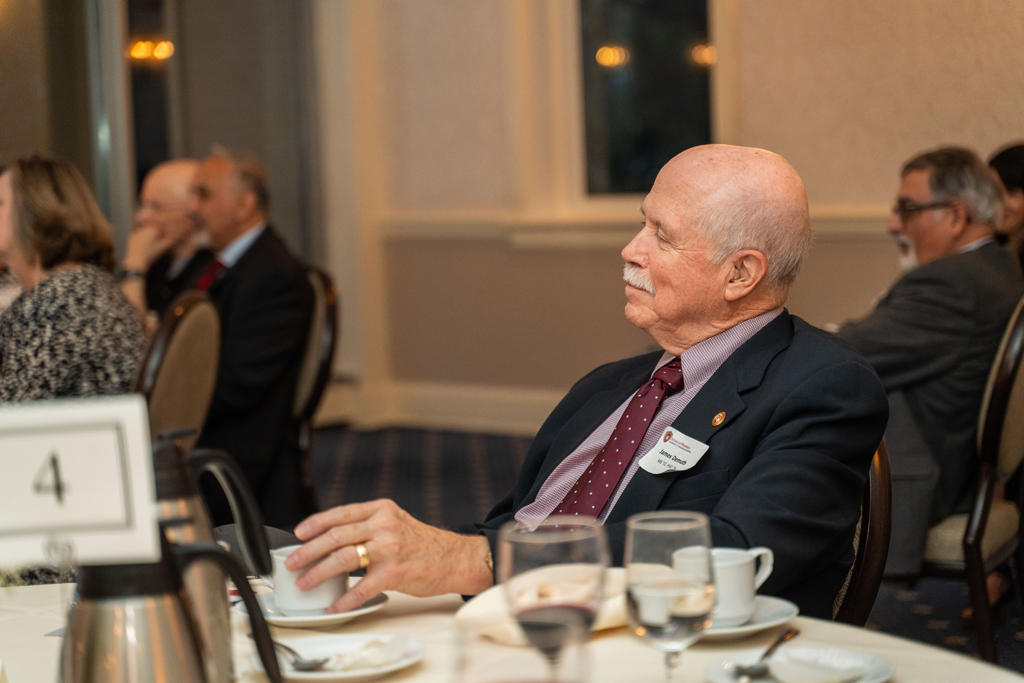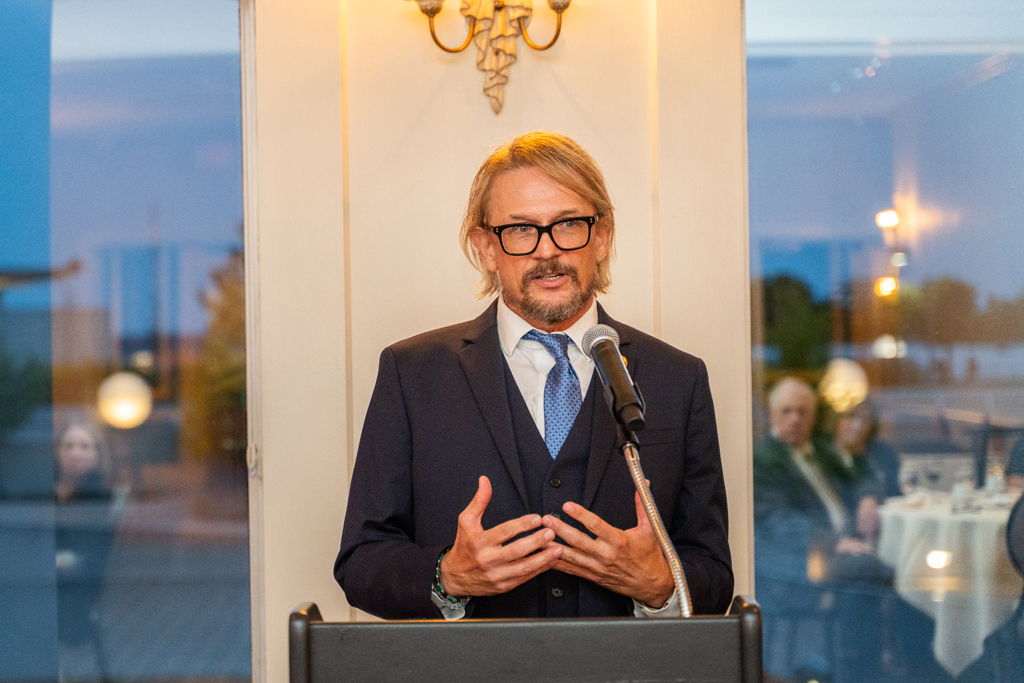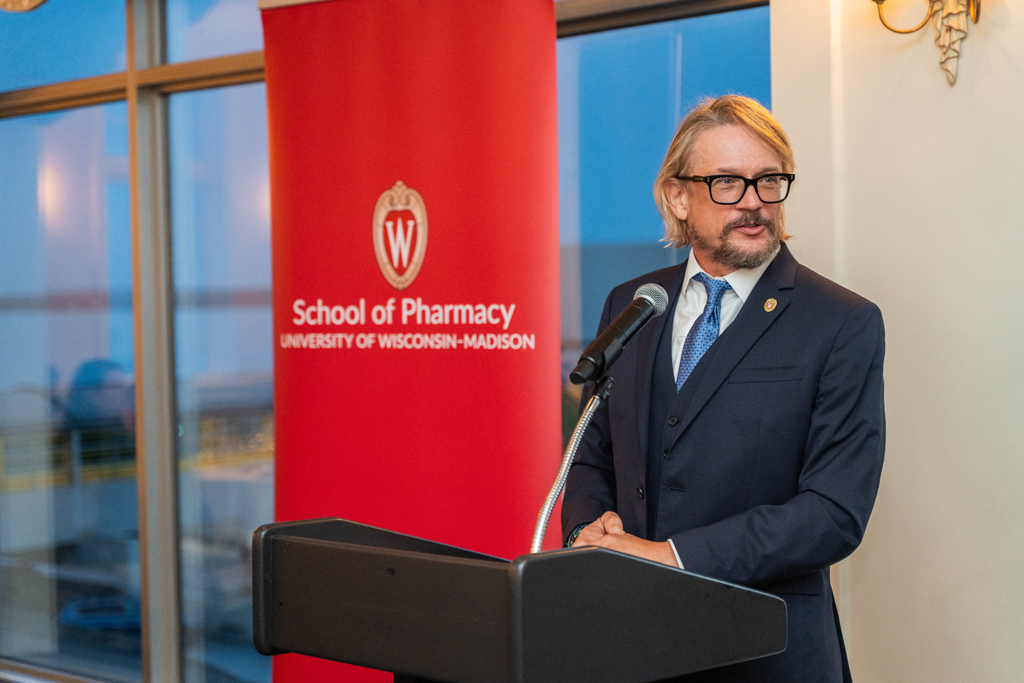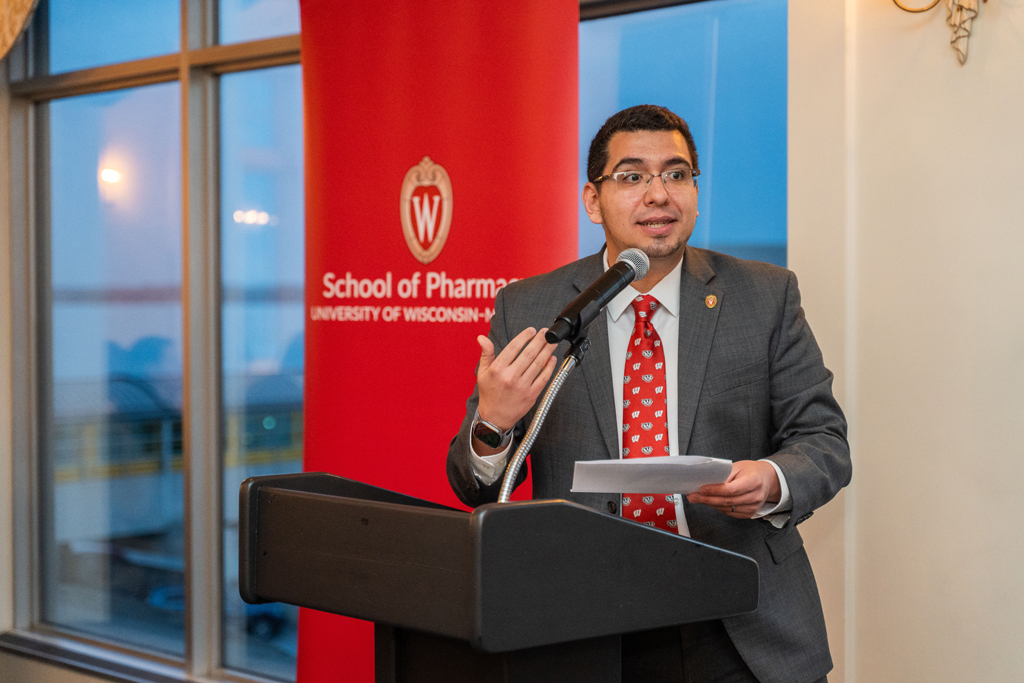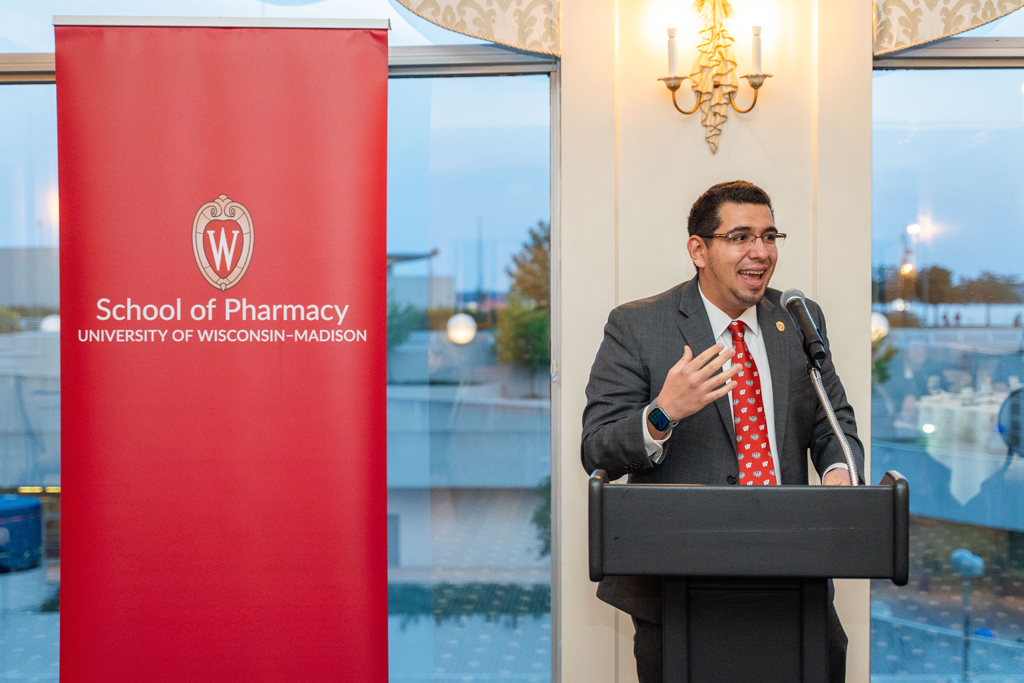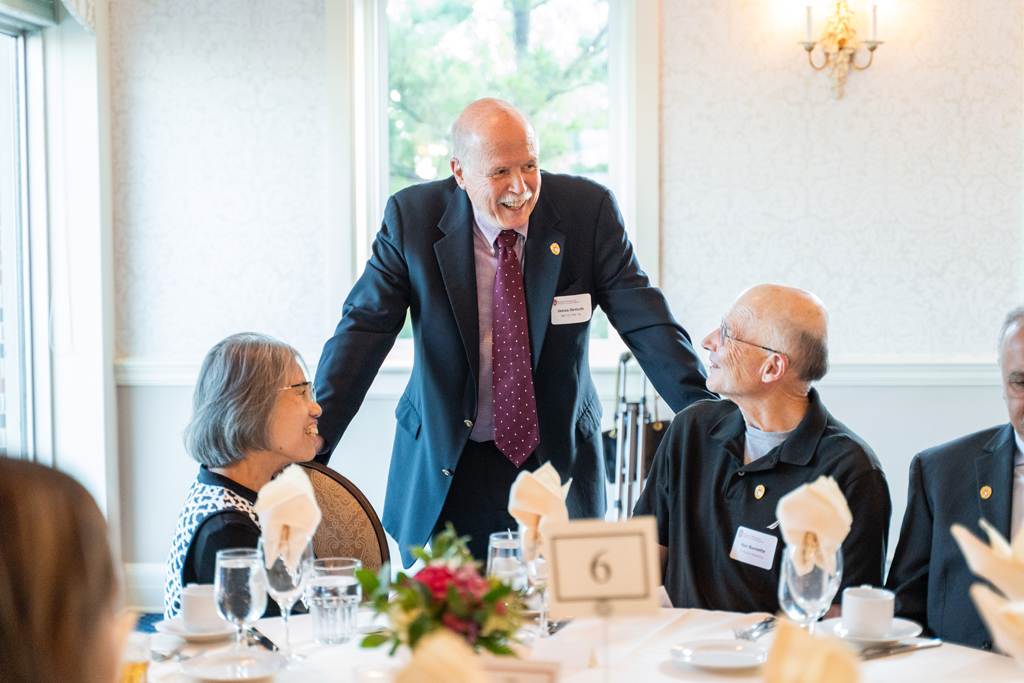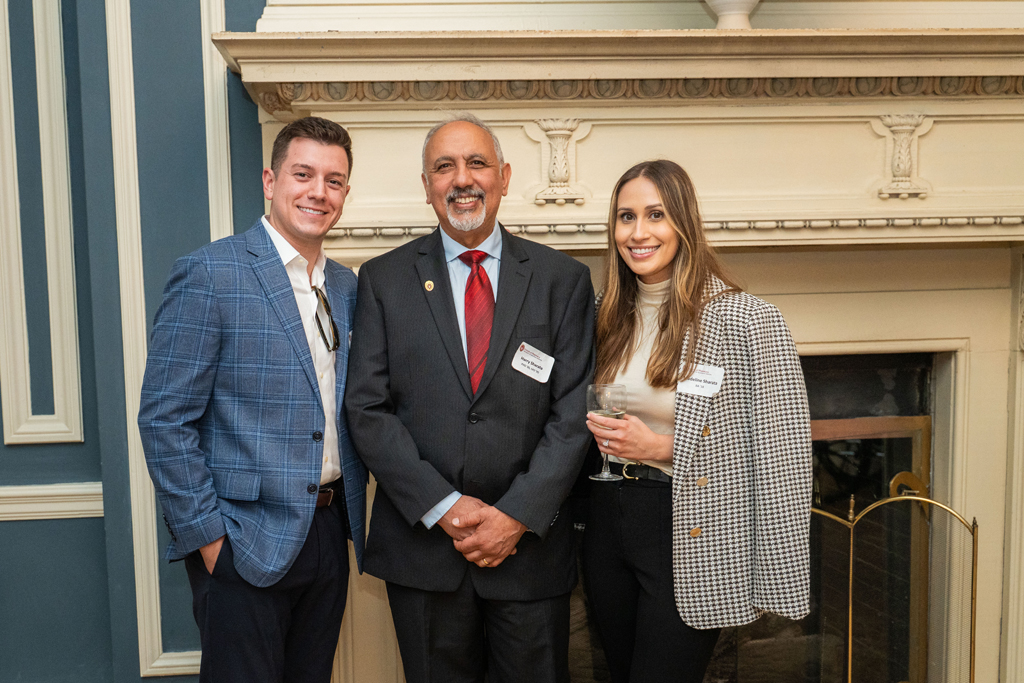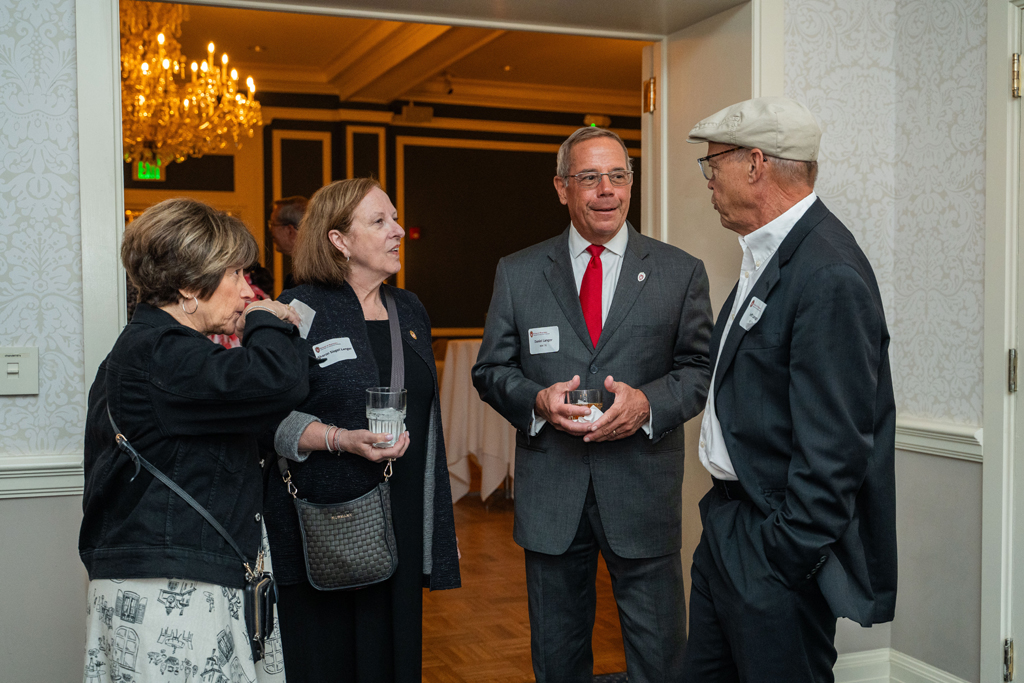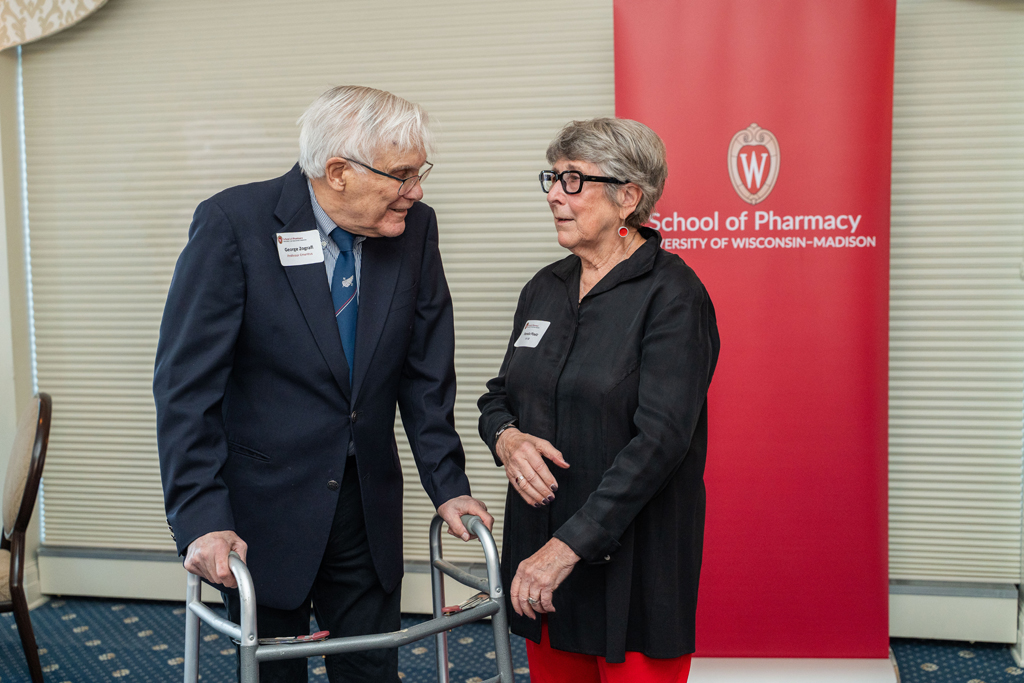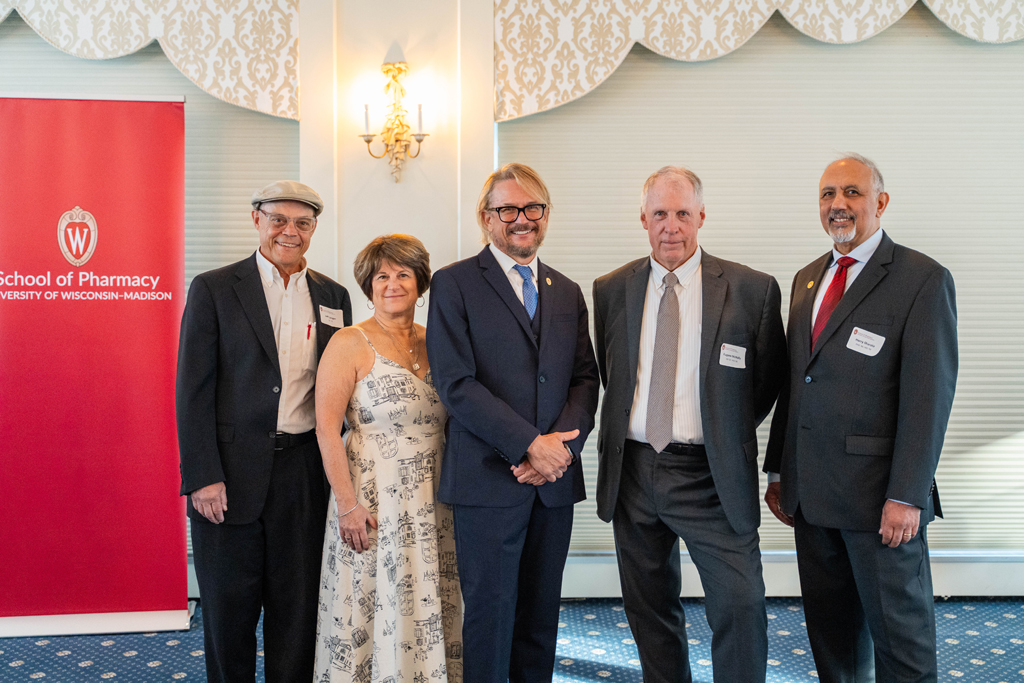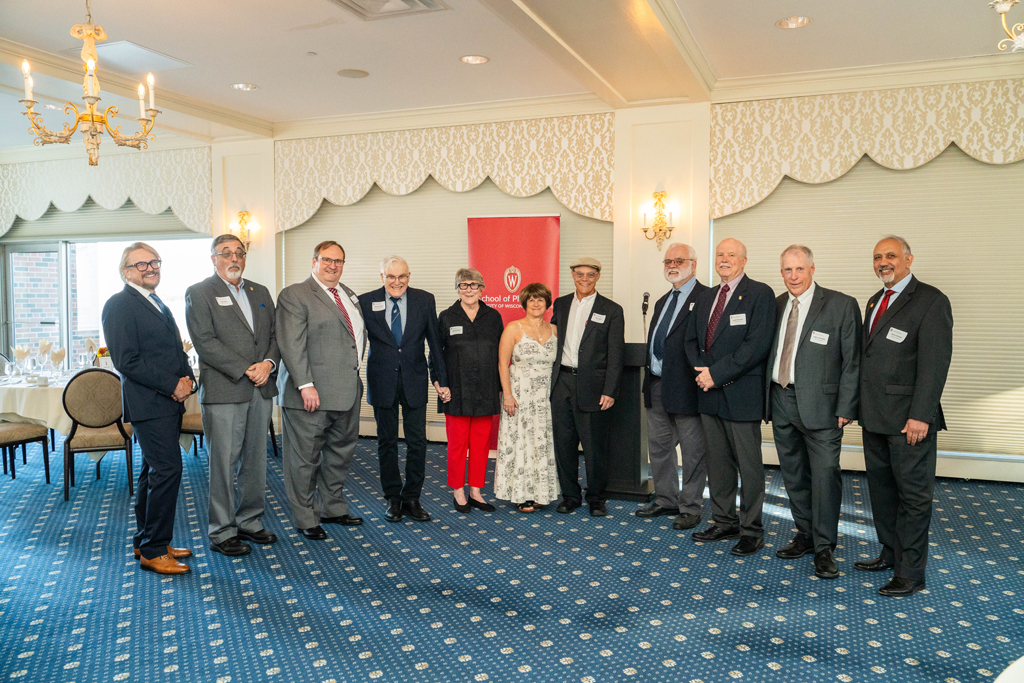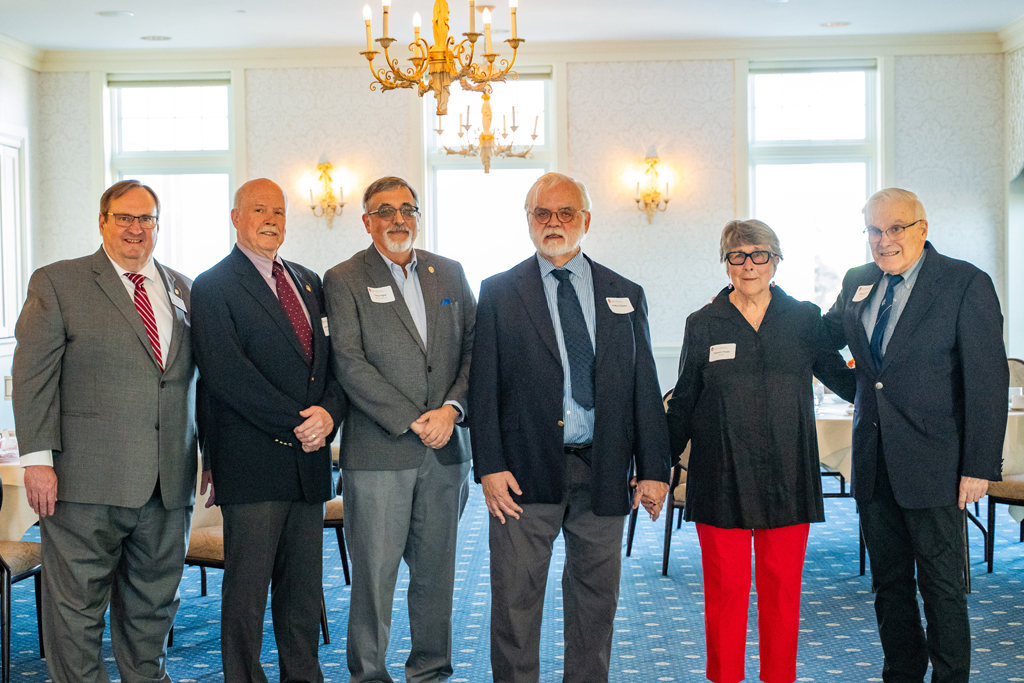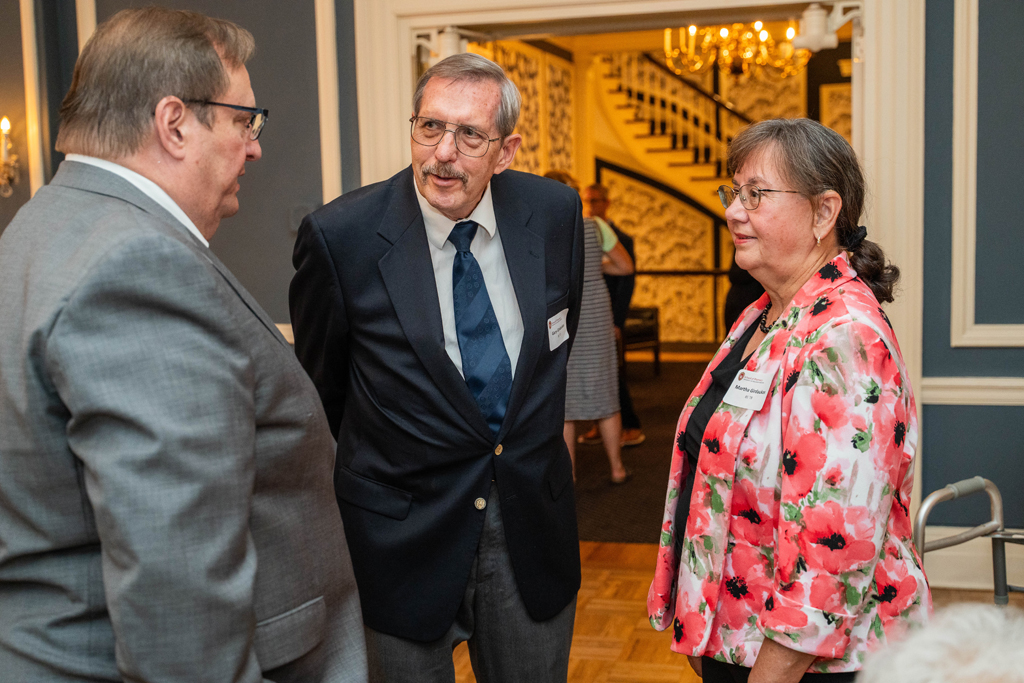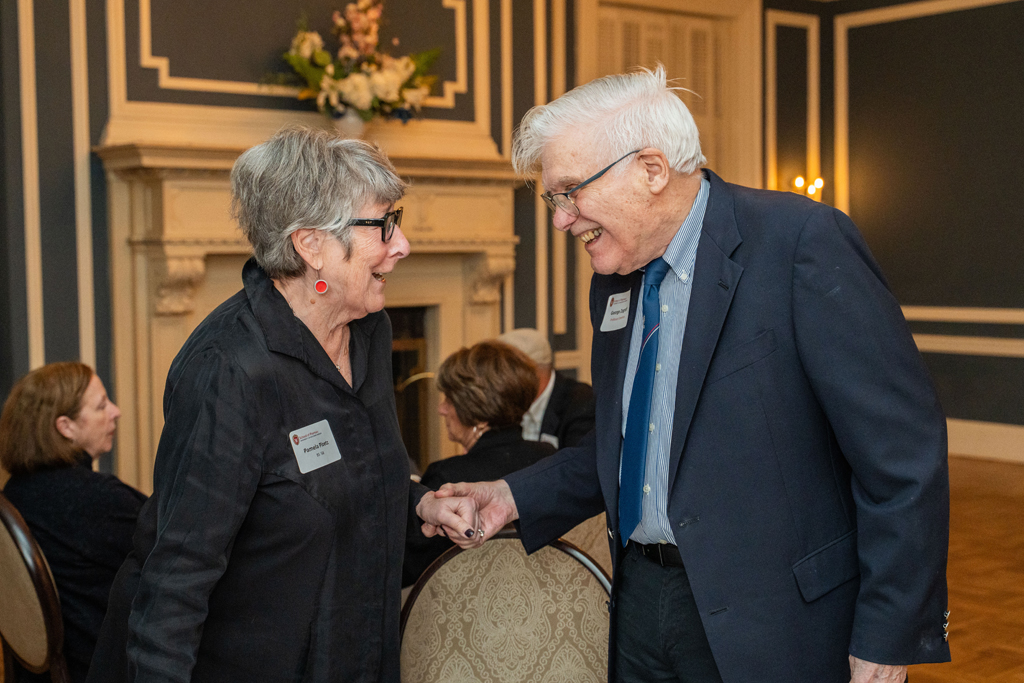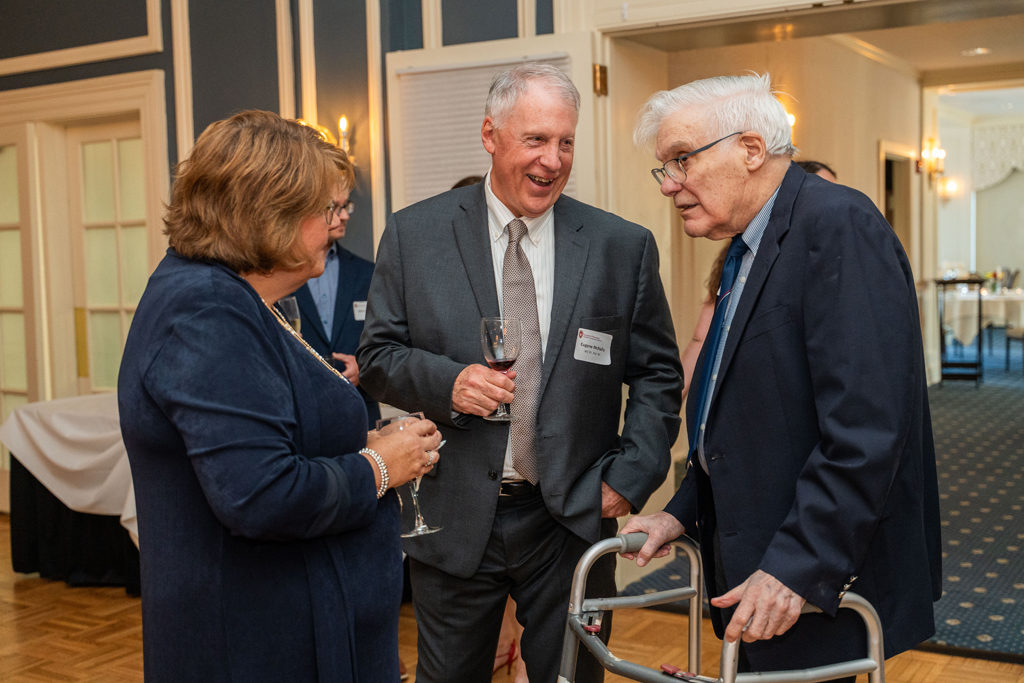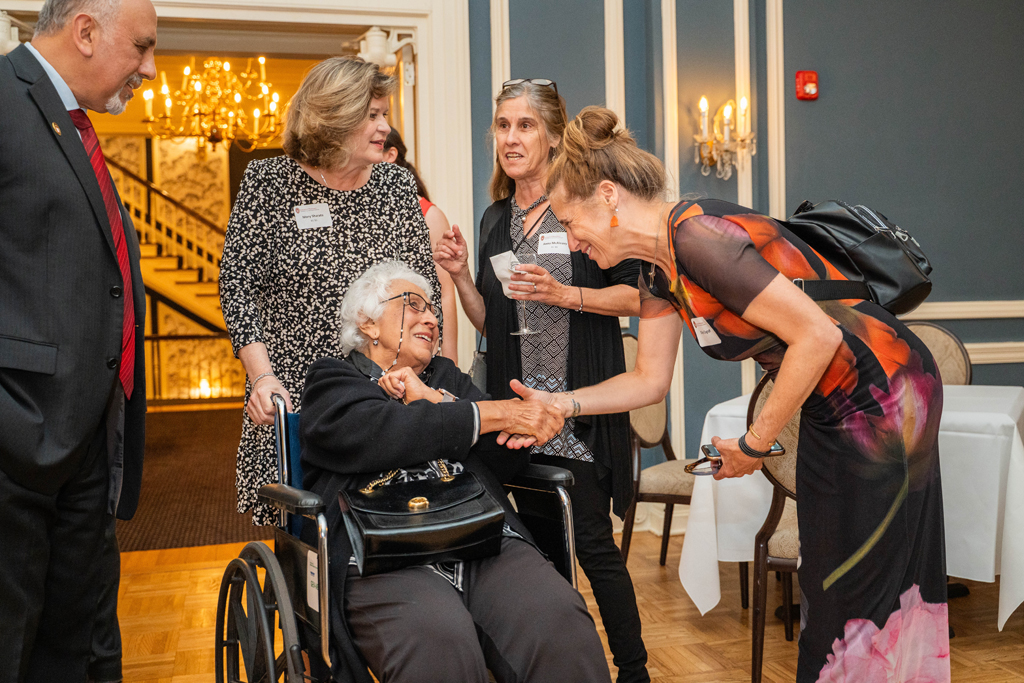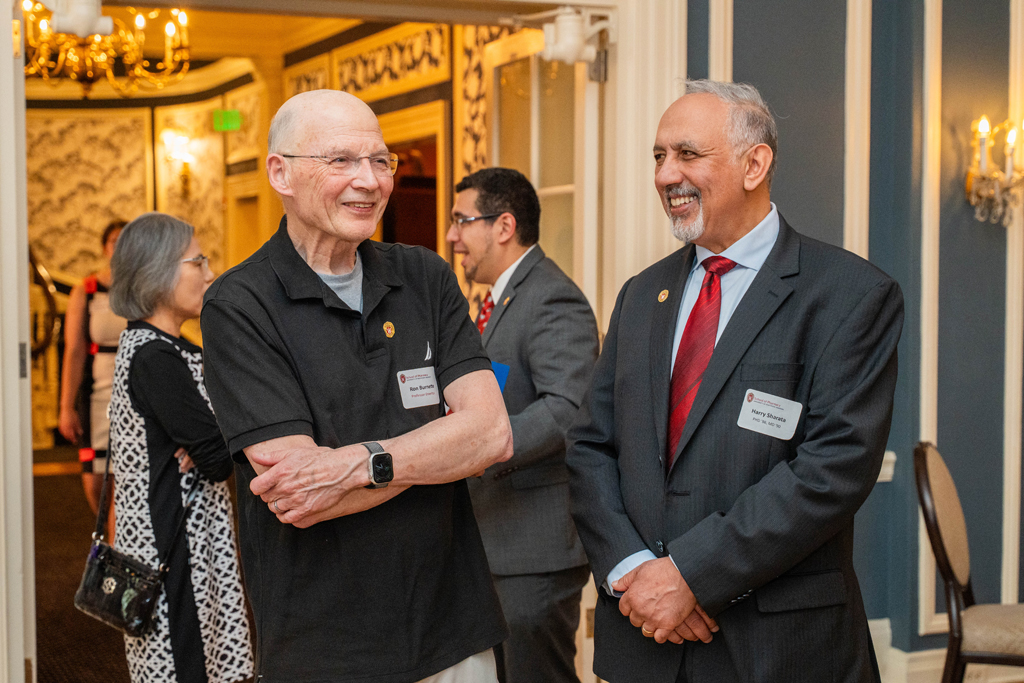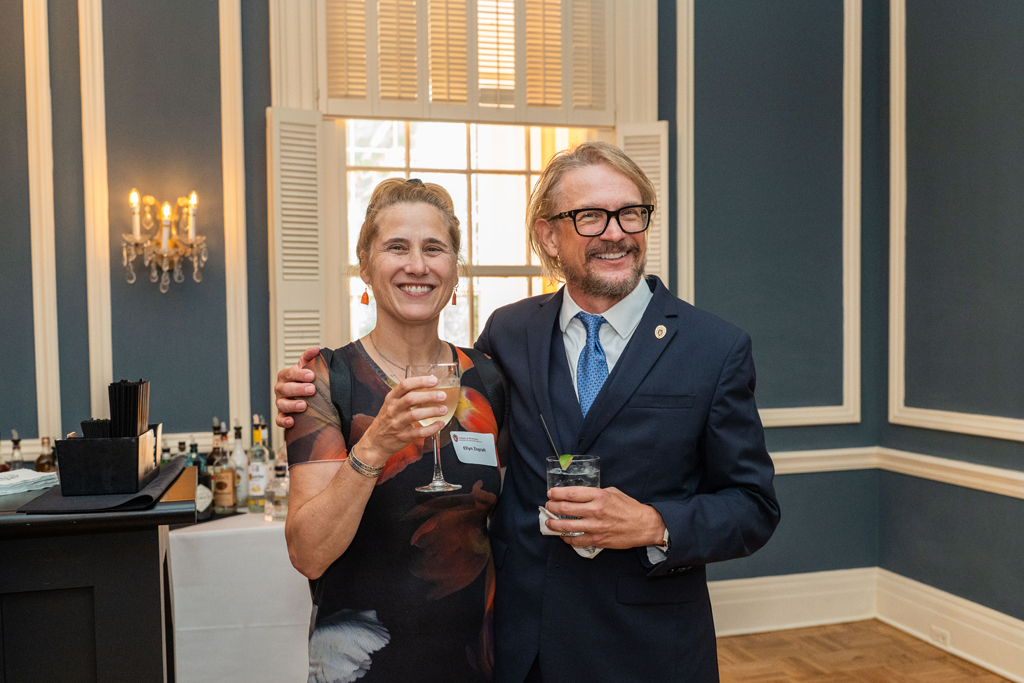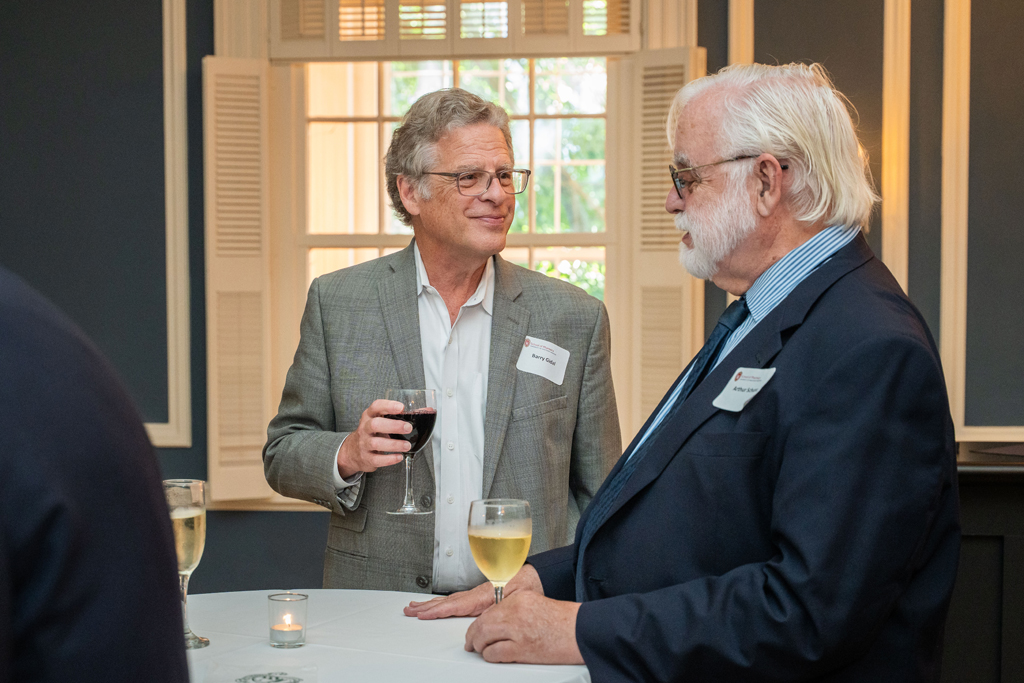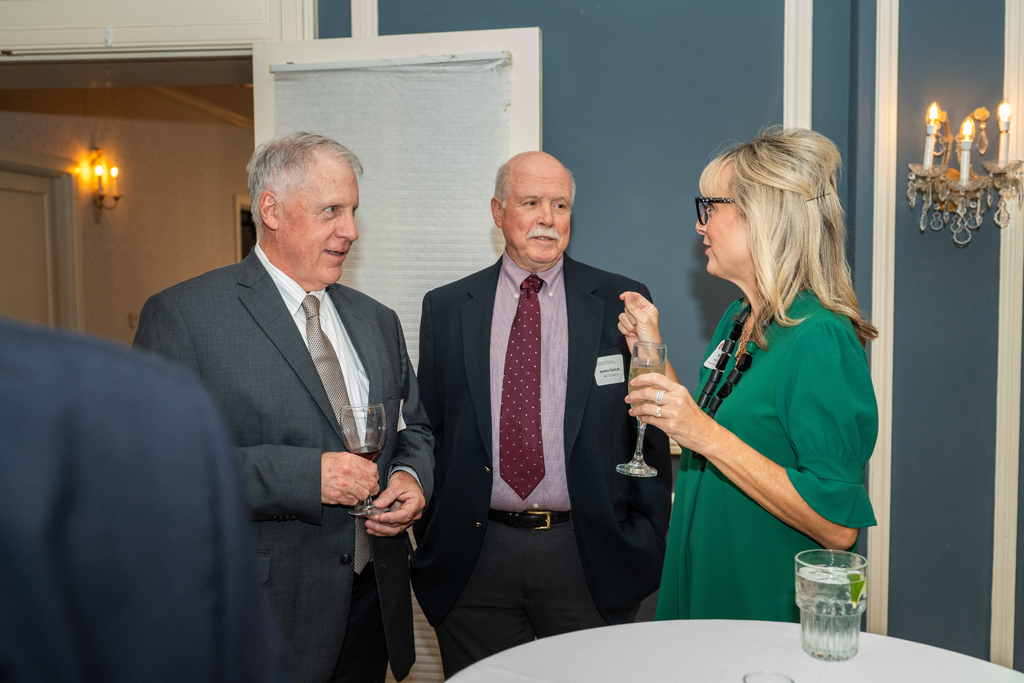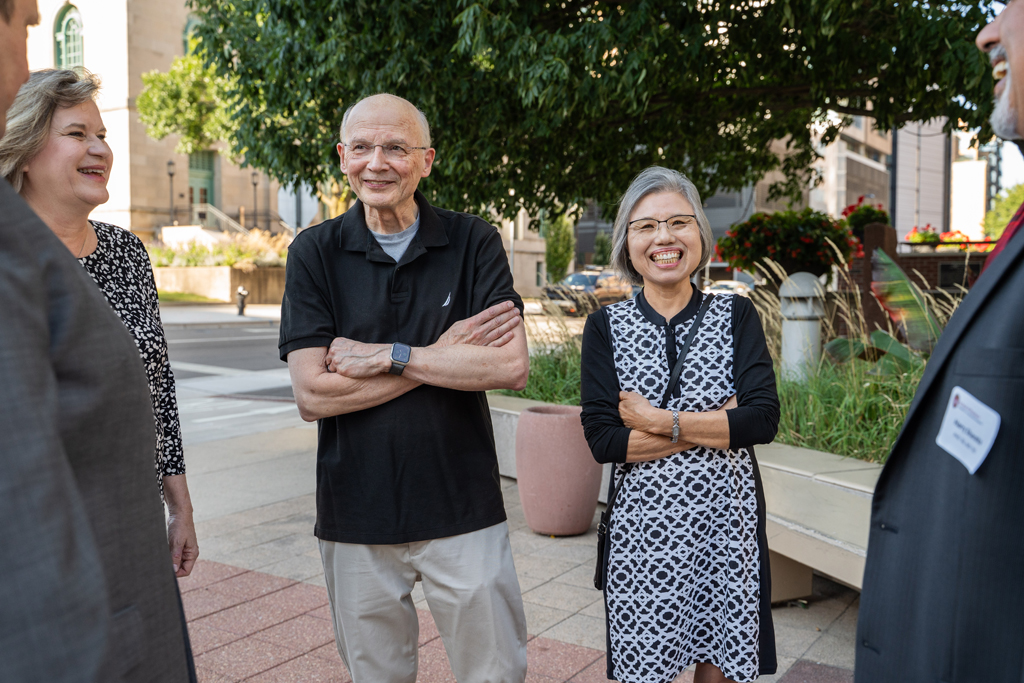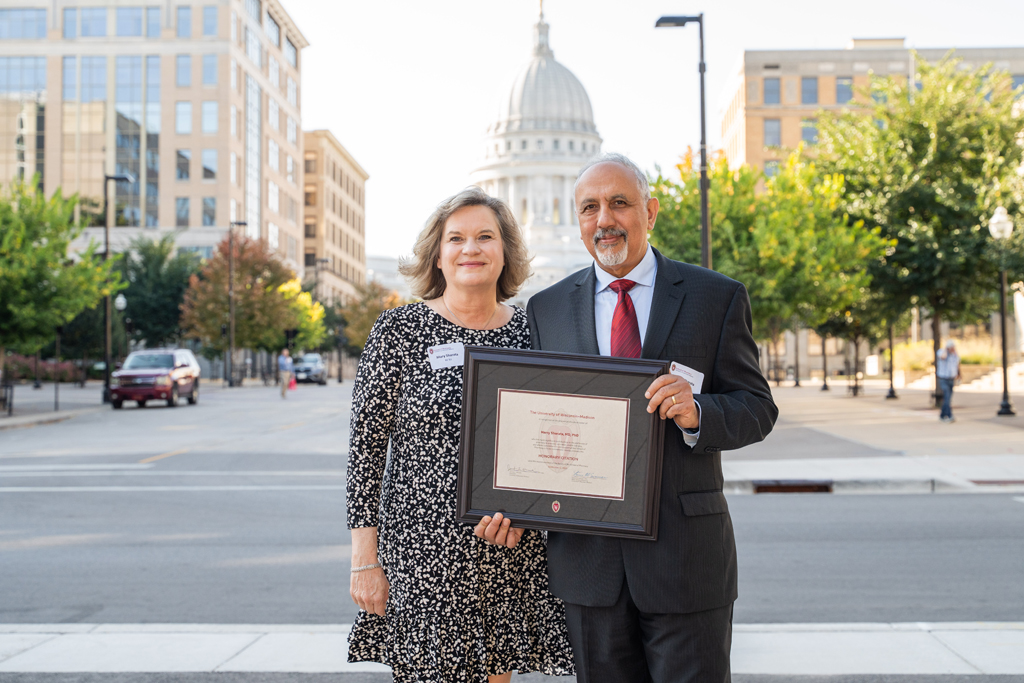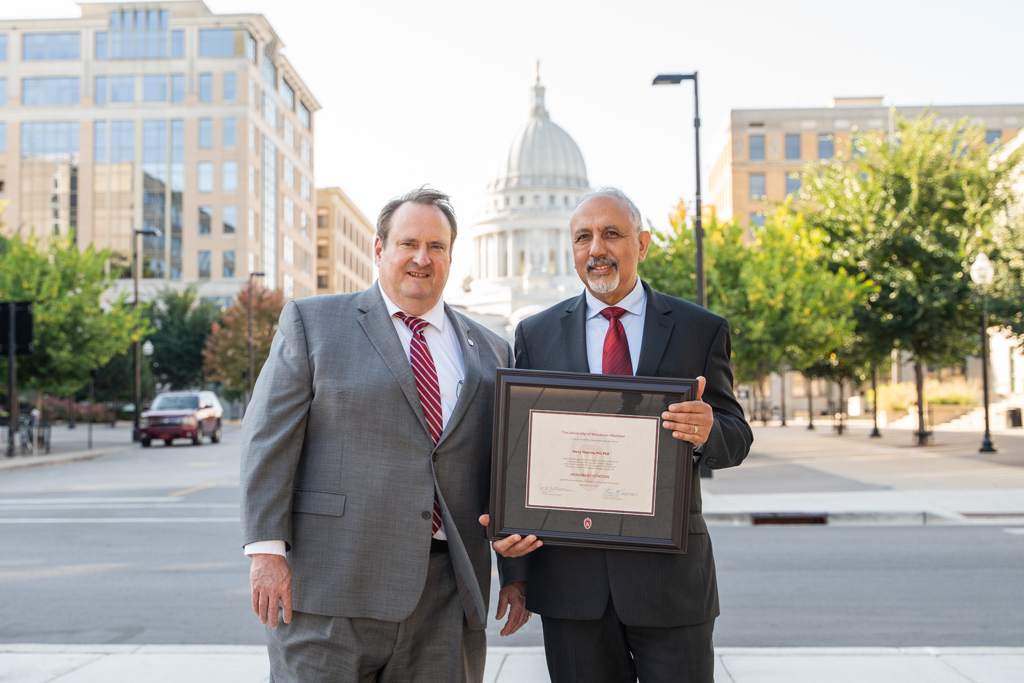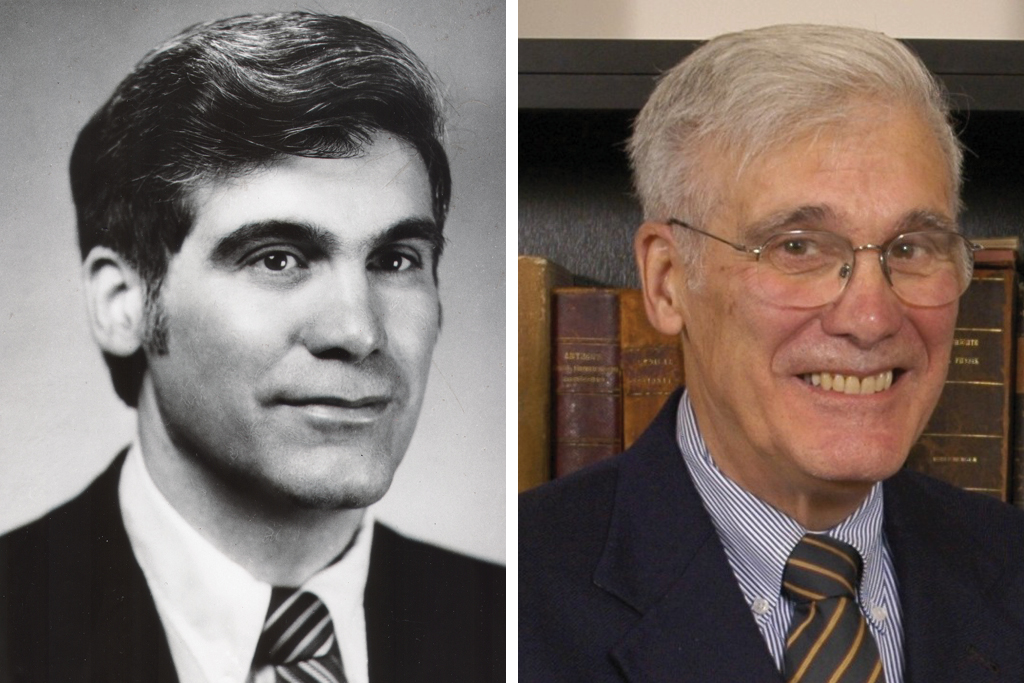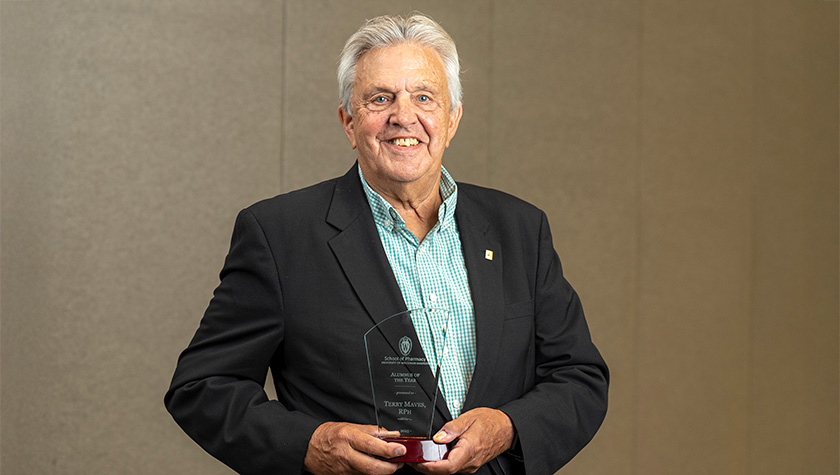
The School of Pharmacy’s highest honor celebrates leadership in academia, industry, and practice
By Katie Ginder-Vogel
Each fall, the University of Wisconsin–Madison School of Pharmacy honors alumni and friends whose work has reshaped the landscape of healthcare. From breakthroughs in pharmaceutical science to innovations in clinical practice and industry leadership, the School’s Citations of Merit celebrate visionaries whose impact reaches far and wide. This year’s honorees have contributed extensive research and leadership to the pharmaceutical industry, academia, and the field of veterinary pharmacy.
“The 2025 Citation of Merit awardees exemplify the very best of the UW–Madison School of Pharmacy,” says Steve Swanson, dean of the UW–Madison School of Pharmacy. “From groundbreaking research in biophysics and dermatology to leadership in veterinary and pharmaceutical practice, this year’s awardees have advanced the profession and inspired those around them.”
The 2025 honorees are:
- John Hill, Owner, Seattle Biophysics Consulting
- Patti Langer (BS ’78) and Jeff Langer (BS ’76), former owners, Pet Apothecary
- Harry Sharata (MS ’85, PhD ‘86), dermatologist and owner, Advanced Dermatology, Inc.
- Eugene McNally (MS, PhD ’89), vice president, PPD
Photos by Paulius Musteikis
John Hill
Shaping the science of stability

Strip the water away from a protein, and it transforms into something entirely new. John Hill pursued that scientific question — how structure drives stability — at the UW–Madison School of Pharmacy, where collaborations with Cathy Royer, former professor, and George Zografi, professor emeritus and former dean of the School, launched him into a decades-long career at the leading edge of biophysics and biotherapeutics.
Hill, now the owner of Seattle Biophysics consulting and affiliate associate professor at the University of Washington School of Pharmacy and Department of Bioengineering, first studied chemistry and biochemistry at the University of Wisconsin–Milwaukee, to be close to home. After earning his PhD in biochemistry and biophysics at the University of Illinois Urbana-Champaigne, Hill knew exactly where he wanted to go next: UW–Madison.
“I loved the UW–Madison School of Pharmacy,” Hill says. “Cathy [Royer] was doing traditional biochemistry and biophysics work, and she had super fun grad students and postdocs.”
“Awards affiliated with UW–Madison carry special weight because it’s not just my science, it’s my relationships within a larger organization being recognized, all of which I enjoy and value.”
–John Hill
In Royer’s lab, which focused on novel approaches to assessing the complex relationships between a protein’s structure, stability, and function, and how that relates to biotherapeutics and small molecule therapeutics, Hill found a natural fit for his own interest in how protein structures influence disease. That work soon connected him to Zografi’s research group as well.
“Those were the early days of trying to understand protein engineering and biophysics, and I had a background in the biophysics of studying proteins in the so-called solid state — if you get rid of enough water, proteins turn into something else,” Hill says.
After completing his postdoc, Hill moved to Seattle to join Icos, a company headed by a biotech visionary and founding leader of Amgen, and a Wisconsin native, George Rathmann. At Icos, the lead drug candidate — the future Cialis — targeted hypertension and had complicated formulation challenges that were being solved by Zografi alum Sandy Koppenol (MS ’93, PhD ’96). He stayed in contact with Zografi, with whom he remains close friends and collaborators.
“I learned a lot about stabilization and did analytical chemistry work supporting drug discovery, pharmacokinetics and drug metabolism, and protein biophysics and formulation development,” Hill says. “Icos had a new perspective on protein formulation for the solid-state, and George and I talked about this a lot.”
Collaborating with Zografi and his former postdoc, Evgenyi Shalaev, a recognized leader in protein stabilization, opened the door to a partnership that has spanned more than 25 years. Together, the group has published numerous peer-reviewed articles and contributed chapters to influential books in the field.
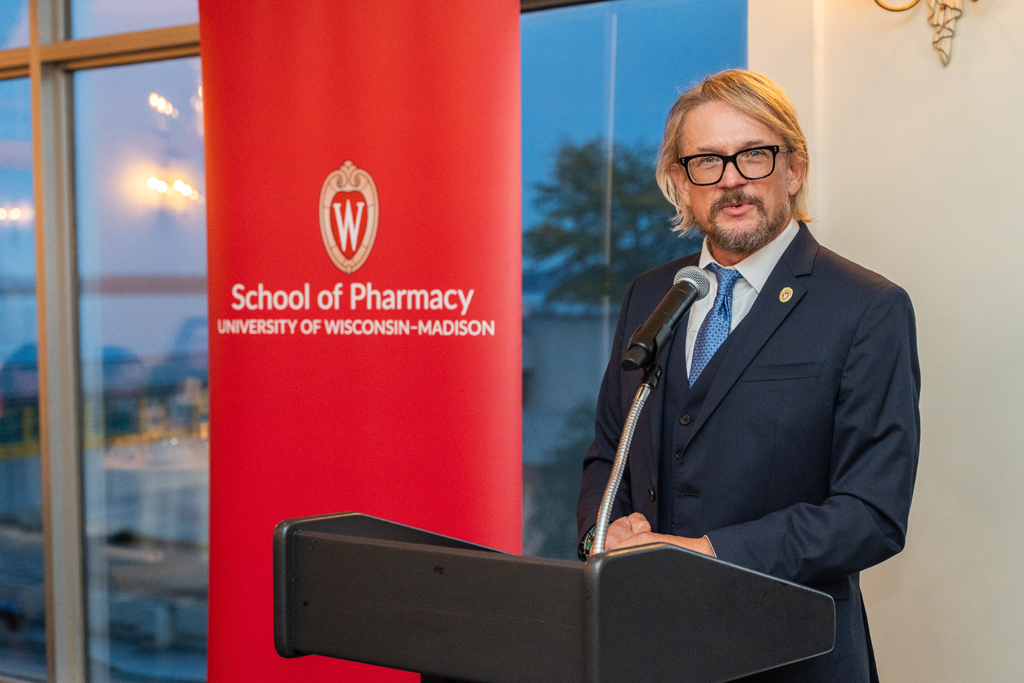
“This collaboration and friendship is a big highlight of my School of Pharmacy experience and connection,” he says.
Hill went on to work for Amgen in drug metabolism and pharmacokinetics, doing translational research for preclinical activities and leading a biophysical sciences group, all while staying closely connected to School of Pharmacy alumni.
“I was looking at the relationship between formulation and protein stability, and how protein structure and stability relate to function, while continuing the collaboration with George and Evgenyi on these topics,” he says. “I was also looking at small molecule pharmacokinetics and drug metabolism challenges, and people in this field work with formulation and drug delivery people. Mehran Yazdanian (MS ‘88, PhD ‘90), who has done phenomenal work in understanding the relationships between formulation development, transporters, and cellular permeability on small molecule pharmacokinetics, was quite helpful.”
After leaving Amgen to work for a startup Fcell therapy company, Hill joined a consulting group focused on proteins as therapeutics and cell and gene therapy, which in turn was acquired by BDO, whose life science practice supports startups. At BDO, he served as the managing director of the BioProcess Technology Group.
“Startup companies are often academic spinoffs that need significant help in therapeutic development activities like manufacturing, so we provide support in making, analyzing, and formulating biological drugs for clinical trials. BDO also helps manage finances and taxes, and they support obtaining and managing federal grants and contracts for life science companies,” Hill says.
Following his time at BDO, Hill returned to consulting in 2025, while also lecturing for several bioengineering and medicinal chemistry courses at the University of Washington, is a guest instructor at the National Taiwan University of Science and Technology, and guest instructor and mentor for the School of Pharmacy’s continuing education courses. He works with longtime friends Yazdanian, Jayne Hastedt (MS ‘88, PhD ‘90), Jason LePree (PhD ’95), and Leslie Dickman, teaching faculty in the School's Division of Pharmacy Professional Development.
“It’s a very caring network and community. All of us would pick up the phone in a heartbeat.”
–John Hill
“This whole course is phenomenal,” he says. “We have this online group office hour every month during the semester, when students can ask us questions about the course material and questions about our careers, lives, and grad school experiences.”
Hill says the School offers students an excellent education, professional readiness, and a unique network.
“It’s a very caring network and community,” he says. “All of us would pick up the phone in a heartbeat.”
Surrounded by many friends who are also Citation of Merit honorees — including Zografi, Shalaev, Hastedt, Yazdanian, and others — Hill says he feels especially honored by the recognition.
“I know many of the honorees and what they’ve accomplished, so I am shocked, very humbled, and extremely appreciative,” Hill says. “Awards affiliated with UW–Madison carry special weight because it’s not just my science, it’s my relationships within a larger organization being recognized, all of which I enjoy and value.”
Connect with John HillPatti Langer (BS '78) and Jeff Langer (BS '76)
Trailblazers in veterinary pharmacy
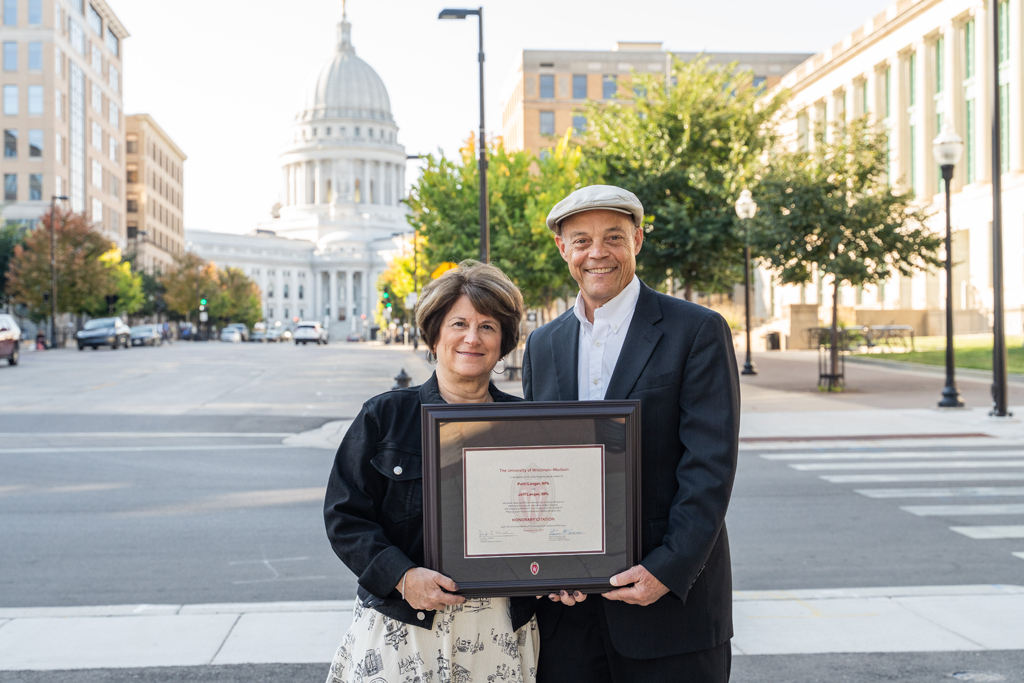
Llamas and lizards. Show pigs and snakes. Even zoo animals. For more than two decades, Patti and Jeff Langer have been filling a niche few others could, treating hundreds of species through their veterinary pharmacy, the Pet Apothecary, in Milwaukee. But their careers started on a more traditional trajectory.
“I come from a proud pharmacy family — my grandfather, father, uncle, and cousin were all pharmacists,” Jeff says. “One of my earliest memories is visiting my grandparents and hoping to help my great aunts punch calcium capsules at their pharmacy. From that point forward, pharmacy felt like a natural path for me.”
After earning his pharmacy degree at the School of Pharmacy, he began his doctorate in pharmaceutical dosage formulation in Professor George Zografi’s research group, completing a project on how ruminant animals, like cows, goats, and deer, digest products and how medication affects them differently.
“I am most grateful for my parents who exposed me early in life to pharmacy and always encouraged me to grow and explore various avenues in my practice.”
–Jeff Langer
“I developed a real appreciation for veterinary medicine and the importance of customizing medications for different species,” Jeff says. “After a year, I realized that research wasn’t the right fit for me, so I made the decision to leave graduate school.”
Patti had a steady job as an outpatient pharmacist, and Jeff began working for Stein Drugs in Milwaukee, owned by Marty Stein (BS ’59).
“My career took off with Stein Drugs, and I continued on with Walgreens after they acquired the chain,” Jeff says. “Eventually, I returned to the family business at Jack Langer Pharmacy, where I began working closely with veterinarians to develop compounded medications tailored to animal patients.”
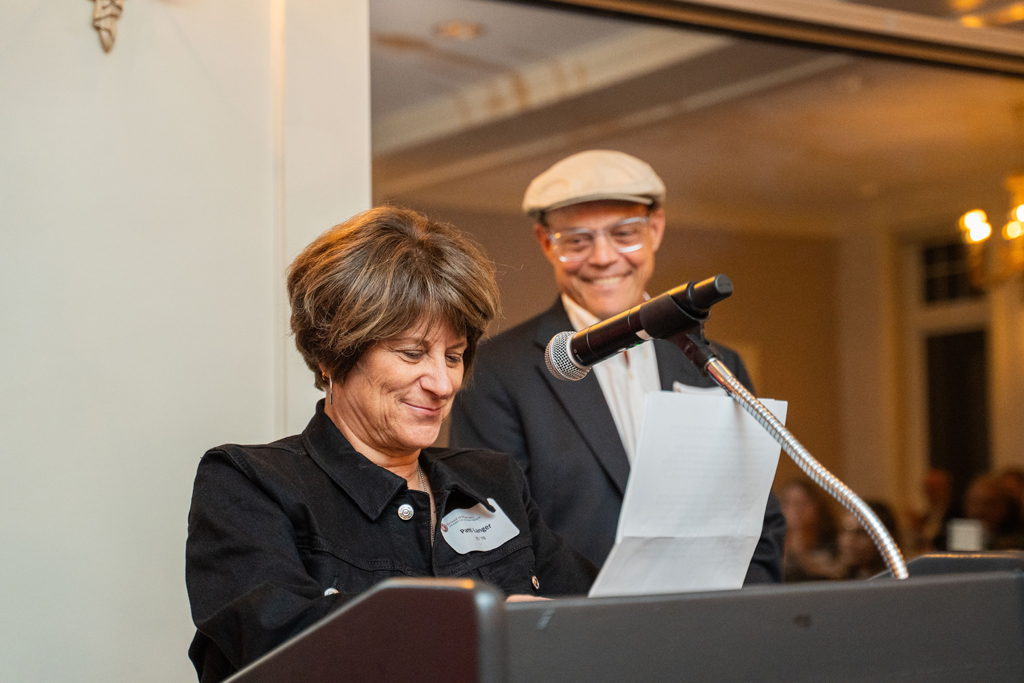
Jeff says working for his father was one of the most important experiences of his career.
“He was a great mentor and taught me his way of doing things, which was a very valuable experience,” Jeff says. “I am most grateful for my parents who exposed me early in life to pharmacy and always encouraged me to grow and explore various avenues in my practice.”
In the 1990s, the Langers bought Jack Langer Pharmacy and opened several additional stores. They sold those businesses in 1995, and Patti had the idea to negotiate restrictive covenants that accompanied the sales to allow the Langers to practice veterinary — not human — pharmacy. The Langers launched Pet Apothecary out of their basement in 1999. They started small, with no loans or other resources, but the business grew steadily, relocating to a dedicated pharmacy space.
“We wouldn’t have had the pharmacy had Patti not had the initial idea for it,” Jeff says. “Every time we had an issue with operations, or I was stumped on how to solve a problem, we talked it out, and those regular discussions were invaluable to the success of the business.”
For the first five to seven years, Langer met regularly with veterinarians to reassure them that he would enhance their business, not take away from it.
The Pet Apothecary dispensed medications for dogs, cats, llamas, snakes, horses, lizards, and even show pigs and cows. When veterinarians moved, they continued to work with the company, allowing the business to expand throughout Wisconsin and Illinois.
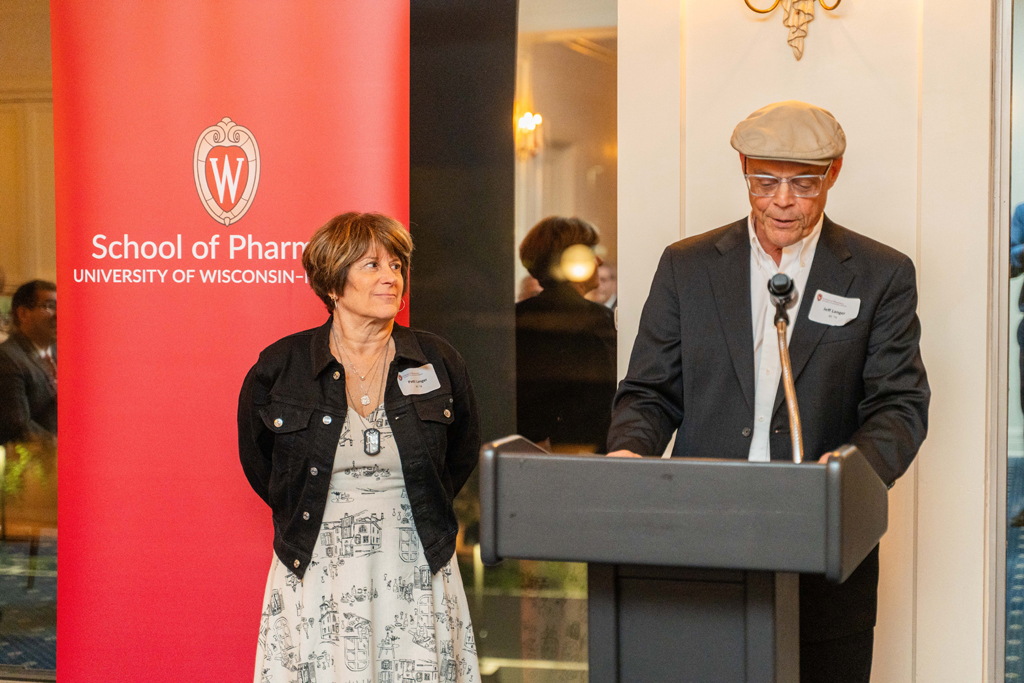
“Throughout the years, we've served pet owners, vets, universities, research labs, and zoos,” Jeff says. “I remain incredibly grateful to our clients, veterinary partners, and the UW School of Veterinary Medicine for their support.”
Having sold the pharmacy in 2018 to retire, the Langers still look for opportunities to stay connected.
“My strong suit was communicating with customers, and I liked standing there chit-chatting with them,” says Patti.
She also maintained close connections to the School of Pharmacy, helping her Class of 1978 to plan reunions and start a very successful scholarship fund. Patti also often helps interview applicants to the School’s PharmD program, thinking back to her days as a student pharmacist.
“I absolutely loved pharmacy school,” says Patti. “Our class studied together and had fun together. I’m still friends with a bunch of them.”
Both Langers are humbled by their Citation of Merit.
“We’ve worked really hard over the years, and we were certainly rewarded in important ways."
–Patti Langer
“We’ve worked really hard over the years, and we were certainly rewarded in important ways, and this is another fun, really nice reward,” says Patti.
As Jeff reflects on his career, he says the ticket to his success was remaining open to new possibilities.
“Identify areas of need, and fill them,” he advises. “Your career may take a circuitous route. I kept my eyes and ears open and had a wonderful family, which was the most important thing to me.”
Connect with Lynne TaylorHarry Sharata (MS ’85, PhD ‘86)
Bridging lab discovery with dermatology patient healing
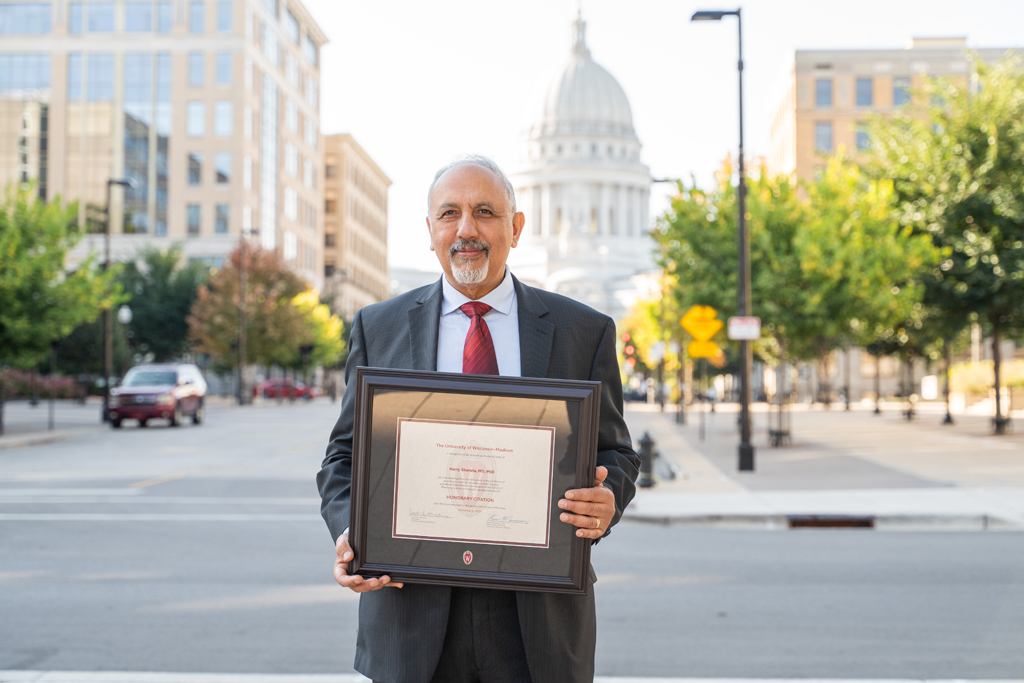
A molecule may look one way in the lab, but on the skin of a patient with eczema or psoriasis, it can behave very differently. That realization — that the skin’s micro-environment changes everything — set Harry Sharata on a unique path from pharmacy to medicine and ultimately to dermatology.
Sharata earned his bachelor’s degree in pharmacy from the University of Maryland, then moved to Madison to pursue his PhD in pharmaceutics at the UW–Madison School of Pharmacy under Professor Ron Burnette, who is now retired. Their research focused on drug absorption through the skin, work that first sparked his interest in dermatology. He discovered that percutaneous absorption varied depending on the site and health of the skin, reminding him that while lab models are simple, real skin is a complex biological organ.
“I feel humbled and honored. It’s truly a fantastic recognition.”
–Harry Sharata
This research inspired him to pursue medicine. He earned his MD from UW–Madison in 1990, followed by clinical training at George Washington University Hospital and Wayne State University. Returning to Madison, he became a clinical professor of dermatology and chief of dermatology at the William S. Middleton Veterans Hospital, where he expanded patient care, research, and training for residents.
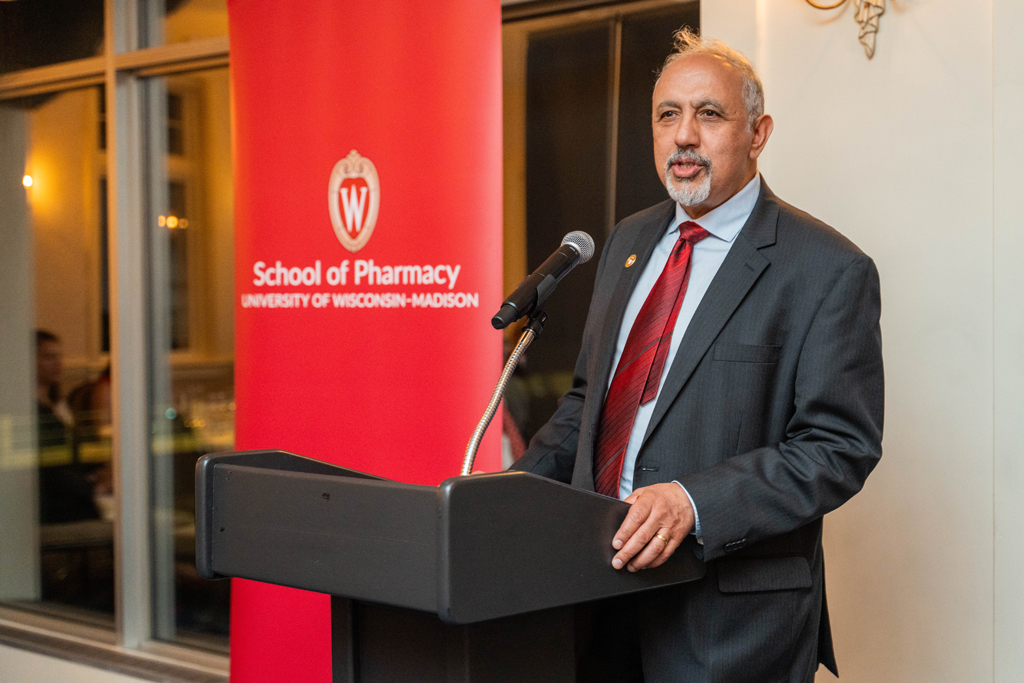
In 1997, Sharata and his wife, Mary (BS ’83), a UW-trained pharmacist, founded Madison Skin and Research, Inc., conducting early-phase clinical trials that contributed to new treatments in dermatology.
“Ultimately, whether as pharmacists, physicians, or scientists, what we do is take care of patients and alleviate suffering,” he says. “You’re a better scientist if you understand what patients are up against.”
Sharata describes his career as “broad-spectrum,” spanning teaching, research, and patient care. He values both the one-on-one impact of clinical practice and the wider impact of clinical investigation. Today, he continues to serve patients in Madison, Monroe, and Freeport, Illinois, enjoying the independence of private practice.
Upon receiving the Citation of Merit, he reflects, “I feel humbled and honored. It’s truly a fantastic recognition.”
Connect with Harry SharataEugene McNally (MS ‘87, PhD '89)
Shaping the future of pharmaceutics
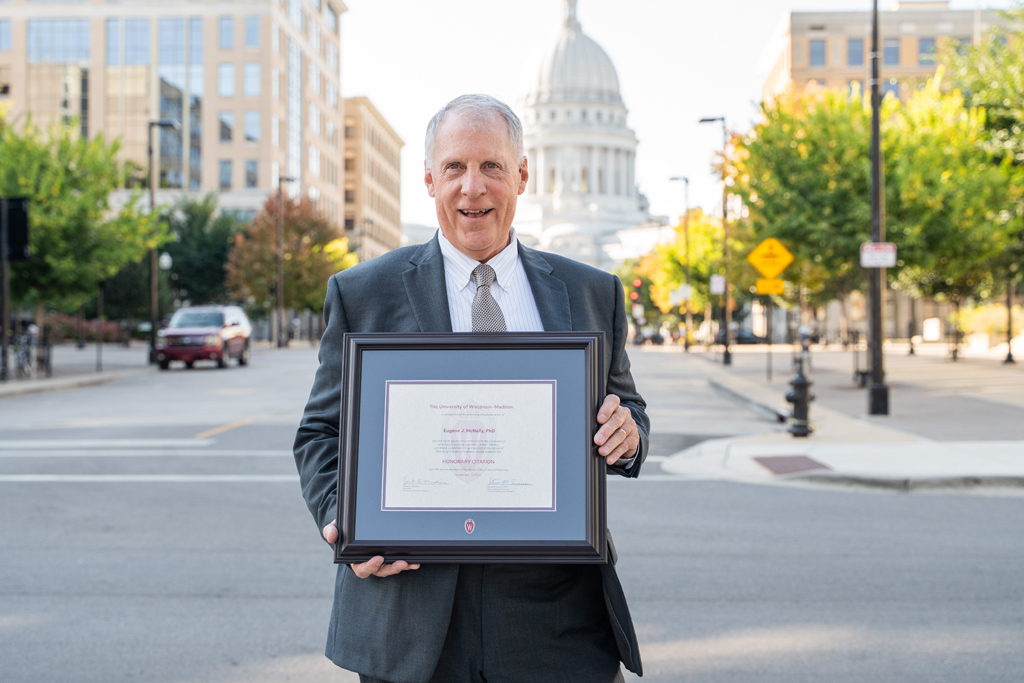
From the lab bench to the boardroom, Eugene McNally has built a career at the center of pharmaceutical development, guiding new drugs from concept to clinic and helping organizations navigate the complexities of manufacturing, formulation, and regulatory strategy.
He discovered the field of pharmacy in high school on Long Island, working in a community pharmacy where the pharmacist gave him the responsibility of helping to run the store and assist with compounding. That drove him to attend pharmacy school at Duquesne University in Pittsburgh, where he got the bug to become a Badger.
“I did an internship my fourth year of pharmacy school with some UW–Madison graduates working in the pharmaceutical industry who encouraged me to consider the School of Pharmacy for graduate school,” McNally says. “Madison is a really nice community.”
“What I find exciting is getting products to their first trial, and once it’s shown they’re safe and effective, another partner takes them commercial.”
–Eugene McNally
After earning his master’s and PhD in pharmaceutics in the lab of George Zografi, former professor and dean at the UW–Madison School of Pharmacy, he joined Boehringer Ingelheim Pharmaceuticals, where he spent more than a decade advancing small-molecule drug development. In 2002, he went on to leadership roles at Cardinal Health and Catalent Pharma Solutions, and then pivoted to consulting work in 2007, founding his own consulting firm, Pharma Development Concepts, LLC.
Despite the breadth of his work, McNally has remained closely tied to UW–Madison and the School of Pharmacy, serving as an instructor for UW–Madison’s Master of Science in Biotechnology program and the School’s Division of Pharmacy Professional Development, where he lectured on the distinctions between the development of small molecule and biological drugs and providing course input on chemistry, manufacturing, and controls (CMC) regulatory strategy. He also joined the advisory board of the School’s Zeeh Pharmaceutical Experiment Station.
“The Zeeh Pharmaceutical Station does lots of contract manufacturing, and I have experience in that area and even brought them some clients,” McNally says. “At the time I first got involved with the Station, I was consulting, and all my clients were outside Madison, so it was nice to have local contacts.”
One of McNally’s clients was PPD, which was expanding their analytical business. In 2009, they offered him a role as executive director of strategic product development.
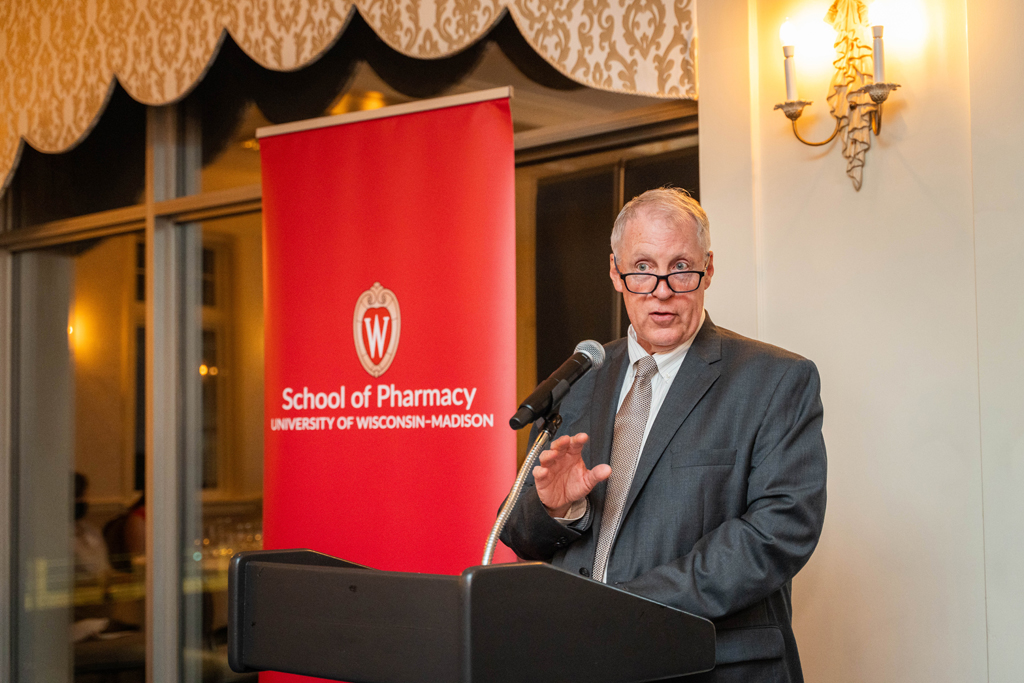
Over the past 15 years at PPD, he has been providing clients with pharmaceutical development consulting services for small molecules and biologics, including sourcing and managing contract research organizations (CROs) and contract manufacturing organizations (CMOs), with direct experience in formulation and analytical development and clinical trial material manufacturing. He became vice president of PPD in 2017.
“I jumped right into their consulting group and have been there ever since,” he says. “To do a clinical trial, a company needs a drug supply, pharmacology/toxicology data, a regulatory strategy, and a clinical plan. Our group at PPD helps clients with the strategy around any one — or all — of those things. My team's business is almost exclusively with biotech companies, and we typically see newer types of programs, molecules, such as genetic and cellular therapies.”
His extensive experience includes supervising more than 120 scientists at several cGMP compliant manufacturing facilities and leading drug development teams, helping to advance new pharmaceuticals.
“Our consulting group within PPD helps companies solve issues like drug supply issues, so they can move their products to clinical trials,” McNally explains. “We’re typically at the forefront of what’s new, and we have enough regulatory and product development experts to figure out what FDA expects. It's really interesting work, being out in front with new, up-and-coming technologies and compounds.”
McNally is proud of his contributions to getting new products to the market — and to the clinic.
“The rate of drug approvals is slow, so it’s not often that you can start with a product and see it get all the way to commercialization,” he says. “What I find exciting is getting products to their first trial, and once it’s shown they’re safe and effective, another partner takes them commercial.”
Following his career dedicated to discovery, development, industry leadership, and teaching, McNally was touched to learn of his Citation of Merit nomination.
“It’s great,” he says. “I didn’t see it coming, and it’s really a nice recognition.”
Connect with Eugene McNally